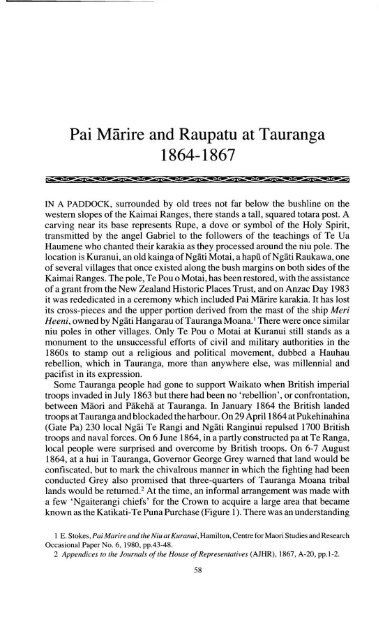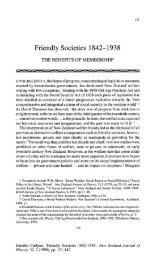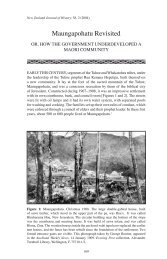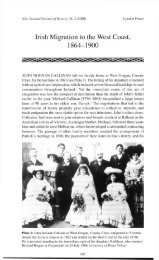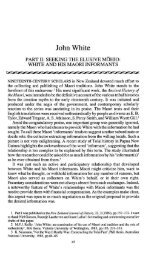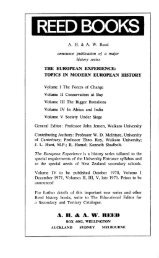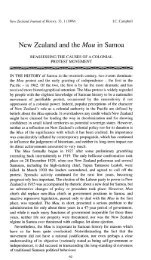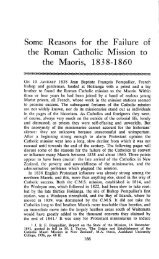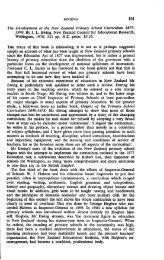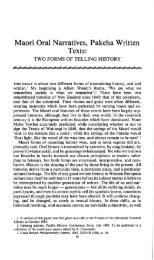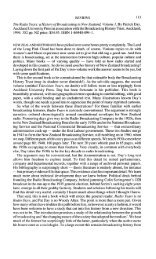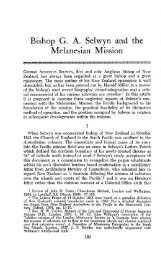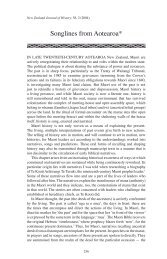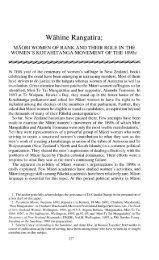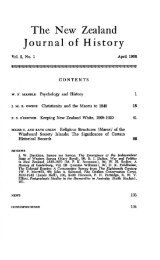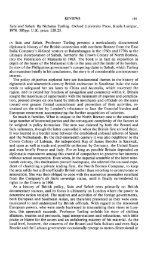Pai Marire and Raupatu at Tauranga 1864-1867 - New Zealand ...
Pai Marire and Raupatu at Tauranga 1864-1867 - New Zealand ...
Pai Marire and Raupatu at Tauranga 1864-1867 - New Zealand ...
You also want an ePaper? Increase the reach of your titles
YUMPU automatically turns print PDFs into web optimized ePapers that Google loves.
<strong>Pai</strong> <strong>Marire</strong> <strong>and</strong> <strong>Raup<strong>at</strong>u</strong> <strong>at</strong> <strong>Tauranga</strong><br />
<strong>1864</strong>-<strong>1867</strong><br />
IN A PADDOCK, surrounded by old trees not far below the bushline on the<br />
western slopes of the Kaimai Ranges, there st<strong>and</strong>s a tall, squared totara post. A<br />
carving near its base represents Rupe, a dove or symbol of the Holy Spirit,<br />
transmitted by the angel Gabriel to the followers of the teachings of Te Ua<br />
Haumene who chanted their karakia as they processed around the niu pole. The<br />
loc<strong>at</strong>ion is Kuranui, an old kainga of Ngāti Motai, a hapū of Ngāti Raukawa, one<br />
of several villages th<strong>at</strong> once existed along the bush margins on both sides of the<br />
Kaimai Ranges. The pole, Te Pou o Motai, has been restored, with the assistance<br />
of a grant from the <strong>New</strong> Zeal<strong>and</strong> Historic Places Trust, <strong>and</strong> on Anzac Day 1983<br />
it was rededic<strong>at</strong>ed in a ceremony which included <strong>Pai</strong> Mārire karakia. It has lost<br />
its cross-pieces <strong>and</strong> the upper portion derived from the mast of the ship Men<br />
Heeni, owned by Ngāti Hangarau of <strong>Tauranga</strong> Moana. 1 There were once similar<br />
niu poles in other villages. Only Te Pou o Motai <strong>at</strong> Kuranui still st<strong>and</strong>s as a<br />
monument to the unsuccessful efforts of civil <strong>and</strong> military authorities in the<br />
1860s to stamp out a religious <strong>and</strong> political movement, dubbed a Hauhau<br />
rebellion, which in <strong>Tauranga</strong>, more than anywhere else, was millennial <strong>and</strong><br />
pacifist in its expression.<br />
Some <strong>Tauranga</strong> people had gone to support Waik<strong>at</strong>o when British imperial<br />
troops invaded in July 1863 but there had been no 'rebellion', or confront<strong>at</strong>ion,<br />
between Maori <strong>and</strong> Pākehā <strong>at</strong> <strong>Tauranga</strong>. In January <strong>1864</strong> the British l<strong>and</strong>ed<br />
troops <strong>at</strong> <strong>Tauranga</strong> <strong>and</strong> blockaded the harbour. On 29 April <strong>1864</strong> <strong>at</strong> Pukehinahina<br />
(G<strong>at</strong>e Pa) 230 local Ngāi Te Rangi <strong>and</strong> Ngāti Ranginui repulsed 1700 British<br />
troops <strong>and</strong> naval forces. On 6 June <strong>1864</strong>, in a partly constructed pa <strong>at</strong> Te Ranga,<br />
local people were surprised <strong>and</strong> overcome by British troops. On 6-7 August<br />
<strong>1864</strong>, <strong>at</strong> a hui in <strong>Tauranga</strong>, Governor George Grey warned th<strong>at</strong> l<strong>and</strong> would be<br />
confisc<strong>at</strong>ed, but to mark the chivalrous manner in which the fighting had been<br />
conducted Grey also promised th<strong>at</strong> three-quarters of <strong>Tauranga</strong> Moana tribal<br />
l<strong>and</strong>s would be returned. 2 At the time, an informal arrangement was made with<br />
a few 'Ngaiterangi chiefs' for the Crown to acquire a large area th<strong>at</strong> became<br />
known as the K<strong>at</strong>ik<strong>at</strong>i-Te Puna Purchase (Figure 1). There was an underst<strong>and</strong>ing<br />
1 E. Stokes. <strong>Pai</strong> <strong>Marire</strong> <strong>and</strong> the Niu <strong>at</strong> Kuranui. Hamilton, Centre for Maori Studies <strong>and</strong> Research<br />
Occasional Paper No. 6, 1980, pp.43-48.<br />
2 Appendices to the Journals of the House of Represent<strong>at</strong>ives (AJHR), <strong>1867</strong>, A-20, pp. 1-2.<br />
58
PAI MARIRE AND RAUPATU AT TAURANGA 59<br />
Figure 1<br />
The <strong>Tauranga</strong> Confisc<strong>at</strong>ed L<strong>and</strong>s<br />
th<strong>at</strong> the area to be confisc<strong>at</strong>ed <strong>and</strong> alloc<strong>at</strong>ed to men of the First Waik<strong>at</strong>o Regiment<br />
as part of the scheme for military settlement would lie between the Waimapu <strong>and</strong><br />
Wairoa Rivers, <strong>and</strong> th<strong>at</strong> military settlers would also be loc<strong>at</strong>ed on l<strong>and</strong> west of<br />
Te Puna River on the K<strong>at</strong>ik<strong>at</strong>i-Te Puna Purchase. Although surveys had been<br />
started <strong>at</strong> <strong>Tauranga</strong>, there was still no final agreement in December <strong>1864</strong> as to<br />
the boundaries of the l<strong>and</strong>s to be confisc<strong>at</strong>ed or purchased by the Crown.<br />
During the l<strong>at</strong>ter half of <strong>1864</strong> the teachings of the Taranaki prophet Te Ua<br />
Haumene were carried throughout the central North Isl<strong>and</strong>. In August, a party of<br />
Waik<strong>at</strong>o <strong>and</strong> Maniapoto people travelled to Taiporohenui, where the Māori King<br />
was given the name Tawhiao by Te Ua. A letter sent to Wiremu Tamihana, son<br />
of Te Waharoa of Ngāti Haua, from Taiporohenui on 6 September <strong>1864</strong>, fell into<br />
the h<strong>and</strong>s of H.T. Clarke, Civil Commissioner <strong>at</strong> <strong>Tauranga</strong>, who presumably<br />
made the following transl<strong>at</strong>ion:
60 EVELYN STOKES<br />
To Te Waharoa, <strong>and</strong> his Tribes <strong>at</strong> th<strong>at</strong> place.<br />
Friends, Salut<strong>at</strong>ions to you <strong>and</strong> the tribe. O the tribe! Salut<strong>at</strong>ions to you, the people who<br />
have been made holy by Jehovah for His Holy mountain. Yes! salut<strong>at</strong>ions to you, oh<br />
friends, bene<strong>at</strong>h the shadow of the Almighty. The words of greeting end. The subject<br />
st<strong>and</strong>s (commences). Friend, Te Waharoa, a word to you <strong>and</strong> your tribes on the side to the<br />
East throughout your boundaries, to request you to shut all the doors of the sword whether<br />
there or beyond you, so th<strong>at</strong> they be stopped up; cease to lift the sword during these days;<br />
though he perish yet wh<strong>at</strong> will be the result of his persistence. Friend, here is the sword<br />
which has been given by Jehovah of Hosts, the sword he gave to Sampson <strong>and</strong> Gideon,<br />
the sword which saved Israel from the h<strong>and</strong> of the Philistines <strong>and</strong> Midianites, th<strong>at</strong> is<br />
Gabriel Rura [Ruler] the angel. Friends, he has appeared <strong>at</strong> this place like a torrent upon<br />
his people <strong>and</strong> upon his man annointed [sic] by him. Wherefore I say unto you, fasten up<br />
all the doors of the Isl<strong>and</strong> Canaan. Enough, then, incline your ears hither my friends to the<br />
words of my mouth. I will open my mouth in a proverb, I will speak to you of the secret<br />
things of ancient times. Which are the hidden things? The precepts which he now sends<br />
to you to close the four doors — th<strong>at</strong> on the East, th<strong>at</strong> on the West, th<strong>at</strong> on the North, <strong>and</strong><br />
th<strong>at</strong> on the South — in order th<strong>at</strong> your faces may be turned hitherward, th<strong>at</strong> we may all<br />
enter <strong>and</strong> vote (take the same side).<br />
O, tribe, turn hither. Your God has descended to the untouched soil (pap<strong>at</strong>upu) of the<br />
Canaan because of his love to his sacred people, because he is bringing you back to your<br />
Rock, even Jehovah.<br />
Enough, O Waharoa, do you send (this) to Hakaraia, <strong>and</strong> his tribes, th<strong>at</strong> they may do<br />
likewise; do you also send (this) to all fighting men in your boundaries. It is for you to<br />
consider <strong>at</strong>tentively the appearance of these words (purport), for they are not uttered by<br />
human man, but given of his own '<strong>Pai</strong>marire' (good will). Ended.<br />
From Tehan<strong>at</strong>ana, from Ahitana, from the Tribes of all the winds (quarters) of Tamarura<br />
(The sons of Rura). 3<br />
Although this missive can be interpreted as an invoc<strong>at</strong>ion for peace, there was<br />
some official constern<strong>at</strong>ion th<strong>at</strong> Tamihana appeared to have joined <strong>Pai</strong> Mārire.<br />
James Mackay Jr., civil commissioner for the Hauraki district, reported a similar<br />
letter <strong>and</strong> suggested Tamihana had arranged for it to be sent 'to the Hauraki<br />
n<strong>at</strong>ives'. 4 Clarke reported on 14 November <strong>1864</strong>; 'I regret to say th<strong>at</strong> there is<br />
every reason to believe th<strong>at</strong> William Thompson has become a convert to this new<br />
faith. This will give the whole movement additional weight', 5 but Grey maintained<br />
th<strong>at</strong> he had inform<strong>at</strong>ion th<strong>at</strong> Tamihana 'has not joined the faith of the false<br />
prophet, <strong>and</strong> th<strong>at</strong> he desires the continuance of peace, <strong>and</strong> has no wish for war' . 6<br />
3 AJHR, <strong>1864</strong>, E-8, pp.5-6; for discussion of the teachings of Te Ua see P. Clark, Hauhau, The<br />
<strong>Pai</strong> <strong>Marire</strong> Search for Maori Identity, Auckl<strong>and</strong>, 1975; Stokes; L. Head, 'Te Ua Haumene', in The<br />
Dictionary of <strong>New</strong> Zeal<strong>and</strong> Biography (DNZB) Vol. One, 1769-1869, Wellington, 1990, pp.511-<br />
13;L. Head, 'The Gospel of TeUaHauraene', Journal of the Polynesian Society, 101,1 (1992),pp.7-<br />
44.<br />
4 AJHR, <strong>1864</strong>, E-8, p.7.<br />
5 ibid., p.5.<br />
6 14 November <strong>1864</strong>, ibid., p.9.
PAI MARIRE AND RAUPATU AT TAURANGA 61<br />
Clarke depicted the <strong>at</strong>mosphere in the <strong>Tauranga</strong> area:<br />
Various rumours are current amongst the N<strong>at</strong>ives — some of the most extravagant kind<br />
were in circul<strong>at</strong>ion, to the effect th<strong>at</strong> the Angel Gabriel had appeared upon earth, <strong>and</strong> had<br />
interposed on behalf of the N<strong>at</strong>ive race. Th<strong>at</strong> a wonderful deliverance was to be wrought<br />
for them: th<strong>at</strong> those N<strong>at</strong>ives who did not remain faithful to the Maori King, nor become<br />
believers in the '<strong>Pai</strong> <strong>Marire</strong>' religion, should be involved in one common ruin with the<br />
Pakeha....<br />
The gre<strong>at</strong> day of deliverance, in which all the Pakehas are to be destroyed, is to be in the<br />
l<strong>at</strong>ter part of December. 7<br />
On Christmas Day the Europeans in the mission st<strong>at</strong>ion <strong>and</strong> military camp <strong>at</strong><br />
Te Papa were left in a st<strong>at</strong>e of panic when it became known th<strong>at</strong> almost all the<br />
Māori occupants of the villages around <strong>Tauranga</strong> harbour had gone inl<strong>and</strong> to<br />
await the day of deliverance. The <strong>Tauranga</strong> people l<strong>at</strong>er returned to their homes<br />
but the fears of the Europeans seemed to be confirmed by news of the murder of<br />
the Church Missionary Society missionary Carl Volkner <strong>at</strong> Opōtiki on 2 March<br />
1865, soon after the arrival of <strong>Pai</strong> Mārire emissaries there, led by Kereopa Te<br />
Rau. The local issues leading to this murder were complex, 8 but for officials like<br />
Clarke the murder was an expression of rebellion, a barbaric rejection of<br />
Christian teachings.<br />
European settler reaction to <strong>Pai</strong> Mārire 'superstition' <strong>and</strong> Hauhau 'rebellion'<br />
(the terms were synonymous) was little short of hysterical. Grey issued a<br />
proclam<strong>at</strong>ion which asserted the powers of the governor to 'resist <strong>and</strong> suppress,<br />
by the force of arms if necessary' the 'fan<strong>at</strong>ical doctrines, rites <strong>and</strong> practices of<br />
<strong>Pai</strong> <strong>Marire</strong>', <strong>and</strong> concluded: 'I call on well-disposed persons, whether N<strong>at</strong>ive or<br />
European, to aid <strong>and</strong> assist me herein to the best of their ability'. 9 Clarke's<br />
reaction to the proclam<strong>at</strong>ion was expressed in a personal letter to T.H. Smith, the<br />
civil commissioner <strong>at</strong> Maketu:<br />
The Arawa now have an authority (I will not give an opinion as to the legality of the<br />
proclam<strong>at</strong>ion) for pitching into their troublesome neighbours provided th<strong>at</strong> they can<br />
s<strong>at</strong>isfy themselves as to their holding 'fan<strong>at</strong>ical Doctrine' — The Governor says or is<br />
made to say th<strong>at</strong> he will suppress by force of arms if necessary all 'fan<strong>at</strong>ical doctrines' of<br />
the Hauhau character — I feel curious to see the working of this — I should like to see<br />
one of the above 'genus homo' caught <strong>and</strong> oper<strong>at</strong>ed upon. I am seriously thinking of<br />
writing to Colonel Greer enclosing a copy of the Proclam<strong>at</strong>ion <strong>and</strong> asking him wh<strong>at</strong><br />
assistance he is prepared to give in the event of a st<strong>and</strong> up resistance on the part of<br />
cantankerous individuals. 10<br />
Clarke, son of a Church Missionary Society missionary, remained intransigent<br />
7 ibid., p.5.<br />
8 See Clark, pp.31-41, <strong>and</strong> E. Stokes, 'Carl Sylvius Volkner', in DNZB, I, pp.566-7.<br />
9 <strong>New</strong> Zeal<strong>and</strong> Gazette, 1865, p.129.<br />
10 Clarke to Smith, 12 May 1865, Letters to T.H. Smith, MS283,1, p.107, Auckl<strong>and</strong> Institute<br />
<strong>and</strong> Museum Library.
62 EVELYN STOKES<br />
in his <strong>at</strong>titude toward <strong>Pai</strong> Mārire. In another letter, he reaffirmed his view th<strong>at</strong><br />
Tamihana had become a <strong>Pai</strong> Mārire: 'He has given up his Christianity'." At no<br />
stage did Clarke appear to consider the biblical origins of the message of peaceful<br />
living in Te Ua Rongopai, consistently interpreting <strong>Pai</strong> Mārire as a political<br />
instrument of the King movement intended to foment rebellion. He wrote: 'I do<br />
not — I never have trusted a Hauhau'. 12 The term Hauhau was being applied by<br />
European officials to anyone with any connection with <strong>Pai</strong> Mārire or to those<br />
who expressed their opposition to l<strong>and</strong> sales.<br />
Although the millennium did not occur, <strong>Pai</strong> Mārire ritual continued in the<br />
villages of the Kaimai ranges in 1865. The rugged bush clad hill country inl<strong>and</strong><br />
of <strong>Tauranga</strong> became a refuge area. Niu poles like Te Pou o Motai <strong>at</strong> Kuranui were<br />
erected in several inl<strong>and</strong> kainga. Local oral tradition in <strong>Tauranga</strong> <strong>and</strong> among<br />
Ngāti Haua maintains th<strong>at</strong> Wiremu Tamihana was involved with the niu <strong>at</strong><br />
Kuranui <strong>and</strong> th<strong>at</strong> he provided the karakia <strong>at</strong> the time it was erected early in 1865. 13<br />
In September 1865 he told the resident magistr<strong>at</strong>e in the Waik<strong>at</strong>o, R.C.<br />
Mainwaring, th<strong>at</strong> 'there was nothing <strong>at</strong> all in the <strong>Pai</strong> <strong>Marire</strong> "Karakia" or service<br />
to instig<strong>at</strong>e or encourage men to commit murder or any other crime. Th<strong>at</strong> on the<br />
contrary the very name of the sect meant nothing more than living quietly <strong>and</strong><br />
peaceably together. Th<strong>at</strong> the outrages recently committed did not origin<strong>at</strong>e in the<br />
<strong>Pai</strong> <strong>Marire</strong> religion, but in the heart of Kereopa <strong>and</strong> his associ<strong>at</strong>es, <strong>and</strong> th<strong>at</strong><br />
therefore no blame was to be <strong>at</strong>tributed to those who professed the new<br />
religion.' 14<br />
Until a decision was made on the boundaries of the l<strong>and</strong> to be confisc<strong>at</strong>ed, <strong>and</strong><br />
arrangements made in the various Māori claims in the K<strong>at</strong>ik<strong>at</strong>i-Te Puna Purchase,<br />
including alloc<strong>at</strong>ion of promised 'N<strong>at</strong>ive reserves', no l<strong>and</strong> could be<br />
distributed. The <strong>Tauranga</strong> district surveyor, Theophilus Heale, reported on 7<br />
April 1865 th<strong>at</strong> he could do nothing further, <strong>and</strong> withdrew his teams. He<br />
expressed his concern <strong>at</strong> the 'disastrous condition of excitement <strong>and</strong> discontent'<br />
among local Maori <strong>at</strong> the delays, 15 <strong>and</strong> pleaded for government action. 'The nonsettlement<br />
of the l<strong>and</strong> question is looked upon by some of the N<strong>at</strong>ives as a<br />
deception <strong>and</strong> a wrong, while others affect to regard it as an ab<strong>and</strong>onment by the<br />
Government of the intention to confisc<strong>at</strong>e any portion of their l<strong>and</strong>s'. 16 There was<br />
a further problem of specul<strong>at</strong>ors seeking desirable coastal l<strong>and</strong>. They offered up<br />
to £4 an acre (compared with the government offer of three shillings per acre).<br />
In <strong>1867</strong>, Mackay <strong>at</strong>tributed the rising Māori opposition to surveys to Wiremu<br />
Tamihana, commenting:<br />
A good deal of this opposition was caused by l<strong>and</strong> specul<strong>at</strong>ors going to the N<strong>at</strong>ives <strong>and</strong><br />
trying to purchase choice pieces of l<strong>and</strong> <strong>at</strong> prices higher than th<strong>at</strong> offered by the<br />
Government <strong>and</strong> by their telling them the Government were not giving enough for the<br />
11 Clarke to Smith, 3 August 1865, ibid., p.78.<br />
12 Clarke to Smith. 10 August 1865. ibid, p.l 12.<br />
13 Stokes, <strong>Pai</strong> <strong>Marire</strong>, pp.43-45.<br />
14 AJHR, 1865, E-14, p.3.<br />
15 AJHR, <strong>1867</strong>, A-20, p.8.<br />
16 ibid., p.9.
PAI MARIRE AND RAUPATU AT TAURANGA 63<br />
l<strong>and</strong>, these persons <strong>and</strong> the N<strong>at</strong>ives overlooking the fact th<strong>at</strong> about one half of the l<strong>and</strong> in<br />
the Puna <strong>and</strong> K<strong>at</strong>ik<strong>at</strong>i Blocks will never be of much use to anyone, <strong>and</strong> the price offered<br />
by the specul<strong>at</strong>ors was for the front l<strong>and</strong> only. Some persons even wished to give the<br />
N<strong>at</strong>ives a sum of £1000 to enable them to return to the Government the deposit paid on<br />
the l<strong>and</strong>. After this it suited the policy of the Hauhau party to keep up <strong>and</strong> foment a bad<br />
feeling between the Ngaiterangi <strong>and</strong> the Government in order to distract <strong>at</strong>tention from<br />
Whak<strong>at</strong>ane, Opotiki <strong>and</strong> Waiapu, which soon became the se<strong>at</strong> of war.' 7<br />
However, Mackay provided no evidence for this assertion, made with hindsight<br />
following the renewed military campaigns in the <strong>Tauranga</strong> district.<br />
Although the survey of the district for military settlement began in September<br />
<strong>1864</strong> it was not until 18 May 1865 th<strong>at</strong> an order-in-council' 8 brought the<br />
<strong>Tauranga</strong> district under the provisions of the <strong>New</strong> Zeal<strong>and</strong> Settlements Act 1863<br />
<strong>and</strong> thus allowed confisc<strong>at</strong>ion of l<strong>and</strong> <strong>and</strong> military settlement to go ahead. The<br />
total area confisc<strong>at</strong>ed was some 86,590 hectares, of which three-quarters were<br />
to be returned to Māori owners 'after due inquiry'. The government had already<br />
made arrangements to acquire 32,375 hectares of this in the K<strong>at</strong>ik<strong>at</strong>i-Te Puna<br />
Purchase. The proclam<strong>at</strong>ion of 18 May defined an area described as l<strong>and</strong>s of the<br />
'Ngaiterangi tribe'. But Ngāi Te Rangi, comprising several hapū of Māta<strong>at</strong>ua<br />
descent, were only one group of the several tribes with rights in the district. Ngāi<br />
Te Rangi rights were derived from conquest of the coastal area in the eighteenth<br />
century. The Ngāti Ranginui hapū, of Takitimu descent, <strong>and</strong> other inl<strong>and</strong> hapū<br />
with Tainui connections occupied a large part of the district west of the Waimapu<br />
River. To the east Waitaha <strong>and</strong> Ngāti Rangiwewehi of Te Arawa descent also<br />
maintained occup<strong>at</strong>ion rights. Regardless, Clarke <strong>and</strong> other officials persisted in<br />
describing all the <strong>Tauranga</strong> people as 'Ngaiterangi', even though Clarke recognized<br />
the complexity of ancestral claims in <strong>Tauranga</strong> Moana:<br />
Most of the difficulties in settling the claims in this district will arise from the fact th<strong>at</strong> the<br />
Ngaiterangi claim only by conquest. They did not destroy the original inhabitants, but<br />
allowed them to remain as cultiv<strong>at</strong>ors of the soil (not slaves), subject to the conquerors.<br />
Some of the principal chiefs took the best of the women as wives, <strong>and</strong> in some cases, some<br />
of the Ngaiterangi women married men of the conquered tribe—the pure Ngaiterangi are<br />
now in the minority. The issue of these intermarriages have, when they thought it would<br />
suit their purpose, ignored their claims through Ngaiterangi, <strong>and</strong> have fallen back upon<br />
the claims derived from the original occupants, this has been the cause of much bloodshed,<br />
even down to a very l<strong>at</strong>e d<strong>at</strong>e, <strong>and</strong> is now frequently the cause of angry deb<strong>at</strong>e. If any<br />
trouble arises in carrying out the plans of the Government it will arise from those who<br />
support the claims of the original inhabitants many of whom have never come in<br />
[submitted to Crown authority]. 19<br />
Curiously, in the 'arbitr<strong>at</strong>ion' on the claims of Hauraki tribes to the K<strong>at</strong>ik<strong>at</strong>i-<br />
Te Puna Purchase in December <strong>1864</strong>, Clarke <strong>and</strong> Mackay accepted descent from<br />
17 Report by Mr Mackay on the K<strong>at</strong>ik<strong>at</strong>i Purchase <strong>and</strong> other questions rel<strong>at</strong>ing to the District of<br />
<strong>Tauranga</strong>, <strong>1867</strong>, Lel/<strong>1867</strong>/114. N<strong>at</strong>ional Archives (NA).<br />
18 <strong>New</strong> Zeal<strong>and</strong> Gazette, 1865, p. 189.<br />
19 AJHR, <strong>1867</strong>, A-20, p.12.
64 EVELYN STOKES<br />
Ranginui as the basis for acknowledging Hauraki rights. The most vociferous<br />
group in disputing 'Ngaiterangi' claims were the Pirirākau <strong>and</strong> other inl<strong>and</strong><br />
hapū, who challenged their right to dispose of the K<strong>at</strong>ik<strong>at</strong>i-Te Puna Block<br />
(Figure 2).<br />
Heale suggested th<strong>at</strong> government inaction had contributed to the current<br />
uncertainty: 'The Pirirakau, <strong>and</strong> other outlying hapus, have adopted the <strong>Pai</strong><br />
<strong>Marire</strong> faith (but without any offensive disposition). Wm. Thompson, who, in his<br />
letters to the writer, had fully assented to the surveying of Te Puna, has since<br />
written to Colonel Greer announcing his intention to dispute its occup<strong>at</strong>ion; <strong>and</strong><br />
affairs appear to be drifting back into the confusion which first led the Ngaiterangi<br />
into the King party, in despair of obtaining a solution of their difficulties by any<br />
other means.' 20<br />
There had not yet been any confront<strong>at</strong>ion, but opposition to European<br />
settlement was increasing, <strong>and</strong> thre<strong>at</strong>s to survey parties were being taken<br />
seriously. No further progress had been made in establishing the boundaries of<br />
the confisc<strong>at</strong>ed block. Nor had all the claims in the K<strong>at</strong>ik<strong>at</strong>i-Te Puna purchase<br />
been settled. Māori complainants alleged th<strong>at</strong> some who had not fought would<br />
lose l<strong>and</strong>, not all owners had been consulted nor had they consented to the<br />
K<strong>at</strong>ik<strong>at</strong>i-Te Puna purchase. Only nine 'Ngaiterangichiefs' had signed the receipt<br />
for the deposit of £1000 in Auckl<strong>and</strong> in August <strong>1864</strong>. 21 There was some<br />
correspondence on the question of jurisdiction of the newly-established N<strong>at</strong>ive<br />
L<strong>and</strong> Court, but no effective decisions were made during the second half of<br />
1865. 22 Māori diss<strong>at</strong>isfaction was voiced <strong>at</strong> a meeting <strong>at</strong> <strong>Tauranga</strong> <strong>at</strong>tended by<br />
the Defence Minister, Colonel Haultain, on 26 February 1866. Enoka Te<br />
Whanake responded to Haultain's question about the boundaries of the l<strong>and</strong><br />
given up <strong>at</strong> a meeting held with the governor in August <strong>1864</strong>:<br />
All I gave <strong>at</strong> the surrender was from K<strong>at</strong>ik<strong>at</strong>i <strong>and</strong> along by the mountains to Wairake[i],<br />
I explained to the Governor th<strong>at</strong> there were certain l<strong>and</strong>s <strong>at</strong> K<strong>at</strong>ik<strong>at</strong>i disputed by the<br />
Thames N<strong>at</strong>ives. The Governor replied: Give me the l<strong>and</strong>; bye <strong>and</strong> bye I will give you<br />
every third acre <strong>and</strong> keep the fourth acre. The fourth acre was taken for the sin {hard) I<br />
had committed, my l<strong>and</strong> only was taken because I had sinned: it was not taken from the<br />
men who did not fight. The Governor said, let there be one piece (i.e. of l<strong>and</strong>). I objected,<br />
<strong>and</strong> said it would not be just th<strong>at</strong> another should suffer for me; let me pay with my property<br />
<strong>at</strong> K<strong>at</strong>ik<strong>at</strong>i <strong>and</strong> Wairake[i], Also, those who own the forest l<strong>and</strong>, let them do likewise.<br />
Then the mana of the l<strong>and</strong> was given to the Governor, <strong>and</strong> the convers<strong>at</strong>ion ended; I have<br />
repe<strong>at</strong>ed all th<strong>at</strong> was said then. 23<br />
Enoka complained th<strong>at</strong> while the mana of the l<strong>and</strong> had been given to the<br />
governor in <strong>1864</strong>, it seemed th<strong>at</strong> he was now dem<strong>and</strong>ing an excessive amount of<br />
their l<strong>and</strong>. 'Why has the governor raised his dem<strong>and</strong>s? Why is the amount<br />
20 27 June 1865, ibid., p. 14.<br />
21 ibid., p.6.<br />
22 E. Stokes, Te <strong>Raup<strong>at</strong>u</strong> o <strong>Tauranga</strong> Moana, The Confisc<strong>at</strong>ion of <strong>Tauranga</strong> L<strong>and</strong>s, Hamilton,<br />
1990, pp.141-5.<br />
23 AJHR, <strong>1867</strong>, A-20, p. 19.
PAI MARIRE AND RAUPATU AT TAURANGA 65<br />
yMaunganui<br />
Rangtaaa<br />
Poutūterangi<br />
T E<br />
RANGI<br />
Bn^Otumoetai<br />
Whareroa<br />
KATIKATI<br />
TE PUNA<br />
PURCHASE<br />
M<strong>at</strong>apihi<br />
Pukekonui<br />
t .Waiwtt<strong>at</strong>awh<strong>at</strong>a<br />
.'•.Whak^maram<br />
•I Buangara' 8 Stm<br />
Te Ranga<br />
Kainga <strong>1864</strong><br />
Cultiv<strong>at</strong>ed areas<br />
Boundary of<br />
50,000 acres<br />
Confisc<strong>at</strong>ed Block<br />
Confisc<strong>at</strong>ed Boundary<br />
on First Survey<br />
CMS Block<br />
i Maero^^ifoi<br />
\ Hunter's-\V<br />
'-TeKSki<br />
"40 K a w a HAPO<br />
THE CONFISCATED BLOCK<br />
Ōtānewainuku<br />
Figure 2<br />
Hapū <strong>and</strong> their Kainga on the Confisc<strong>at</strong>ed Block <strong>at</strong> <strong>Tauranga</strong>
66 EVELYN STOKES<br />
increased?' Haultain maintained th<strong>at</strong> the amount had not been increased. Pene<br />
Taka of Pirirākau commented: 'How many men were in arms th<strong>at</strong> the Governor<br />
should take so many acres?' Haultain's reply was th<strong>at</strong> 'Government will require<br />
certain l<strong>and</strong>s of friendly N<strong>at</strong>ives, on which to put settlers for the protection of the<br />
district. Wh<strong>at</strong> they take they will pay for'. Pene Taka was not impressed <strong>and</strong><br />
replied: 'When you have taken these l<strong>and</strong>s you will keep returning <strong>and</strong> taking<br />
more <strong>and</strong> more'. Enoka, who had not gone to Auckl<strong>and</strong> nor signed the receipt,<br />
questioned the K<strong>at</strong>ik<strong>at</strong>i-Te Puna purchase agreement <strong>and</strong> £1000 deposit as 'the<br />
work of the men who went to Auckl<strong>and</strong>', st<strong>at</strong>ing th<strong>at</strong> he 'knew nothing of the<br />
arrangement' <strong>and</strong> wanted to know the boundaries.' Some of the people who lived<br />
peaceably on the l<strong>and</strong> would object to being involved in th<strong>at</strong> manner'. 24<br />
Grey <strong>and</strong> Frederick Whitaker, Agent of the General Government in the<br />
Auckl<strong>and</strong> Province, came to <strong>Tauranga</strong> on 26 March 1866. Enoka reiter<strong>at</strong>ed th<strong>at</strong><br />
he understood th<strong>at</strong> they had ceded the mana of the l<strong>and</strong>, but th<strong>at</strong> government<br />
dem<strong>and</strong>s for l<strong>and</strong> for settlement were excessive. Moreover, other Māori claimants<br />
to l<strong>and</strong> in the K<strong>at</strong>ik<strong>at</strong>i-Te Puna purchase had not been consulted. Reserves<br />
for Māori had been promised in the confisc<strong>at</strong>ed block between the Wairoa <strong>and</strong><br />
Waimapu, but the promises had not allayed suspicions. A major cause of<br />
dissension was the suggestion th<strong>at</strong> l<strong>and</strong> would also be confisc<strong>at</strong>ed west of the<br />
Wairoa river, while local Māori had understood the river to be the boundary. The<br />
resident magistr<strong>at</strong>e, W.G. Mair, who had acted as interpreter for the governor's<br />
meeting, reported retrospectively from Opôtiki on 20 March <strong>1867</strong>, giving his<br />
version of proceedings:<br />
The N<strong>at</strong>ives were informed th<strong>at</strong> the Eastern boundary should be the Waimapu river for<br />
a considerable distance, <strong>and</strong> then a line over a hill on which a single tree was visible, <strong>and</strong><br />
on to the wooded country about Waohu [Waoku]; but Mr Civil Commissioner Clarke was<br />
to decide upon the exact course the line should take.<br />
The survey was then to extend westward as far as would be necessary to include an area<br />
of 50,000 acres; the N<strong>at</strong>ives were distinctly informed th<strong>at</strong> no point could be named as the<br />
probable limit on th<strong>at</strong> side, but th<strong>at</strong> it might extend as far as Te Puna. They were r<strong>at</strong>her<br />
excited <strong>at</strong> this, <strong>and</strong> said th<strong>at</strong> they would not consent; but upon being informed by the<br />
Governor th<strong>at</strong> they had been tre<strong>at</strong>ed better than any other tribe, but if necessary they<br />
should again be put down by force of arms, they accepted the proposals made to them. The<br />
words of their principal speaker Enoka being 'Governor, we have consented to your<br />
acres'. 25<br />
Mackay had not <strong>at</strong>tended the meeting, but had certainly heard about it: 'I am<br />
told by the N<strong>at</strong>ives' th<strong>at</strong> the governor had said 'he wanted 50,000 acres of l<strong>and</strong>,<br />
<strong>and</strong> if they would not give th<strong>at</strong> then he would take the whole of it'. 26 <strong>Tauranga</strong><br />
Māori were thereby left with little choice.<br />
The survey of the confisc<strong>at</strong>ed block west of the Waimapu river commenced<br />
almost immedi<strong>at</strong>ely. The township of Te Puna had already been surveyed west<br />
24 ibid., p.20.<br />
25 ibid., p.53.<br />
26 Mackay, <strong>1867</strong>, Lel/<strong>1867</strong>/114, NA.
PAI MARIRE AND RAUPATU AT TAURANGA 67<br />
of the Wairoa in April 1865. The coast had also been surveyed <strong>and</strong> some farm<br />
sections marked off near Te Papa <strong>and</strong> <strong>at</strong> Otūmoetai. The new district surveyor,<br />
H.J. Utting, commented on the work of survey parties on the 'Waimapu Block':<br />
'They report however th<strong>at</strong> nothing like an adequ<strong>at</strong>e quantity of "good agricultural<br />
l<strong>and</strong>" can be obtained within the limits of the confisc<strong>at</strong>ed block, as the<br />
gre<strong>at</strong>er part of it is of so rugged <strong>and</strong> broken a character, th<strong>at</strong> scarcely any<br />
practicable road <strong>at</strong> all can be laid out upon it, <strong>and</strong> th<strong>at</strong> roads laid out as required<br />
by the Specific<strong>at</strong>ion would be impassable.' 27<br />
The confisc<strong>at</strong>ed block would include l<strong>and</strong> west of the Wairoa river, not<br />
because the 50,000 acres could not be found between the Wairoa <strong>and</strong> Waimapu<br />
rivers, but because 50,000 acres of 'good agricultural l<strong>and</strong>' were required for the<br />
farms promised to the men of the Waik<strong>at</strong>o militia garrisoned <strong>at</strong> Te Papa.<br />
Meanwhile, the negoti<strong>at</strong>ions on the K<strong>at</strong>ik<strong>at</strong>i-Te Puna purchase had to be<br />
completed. Following the March meeting, Whitaker instructed Clarke <strong>and</strong><br />
Mackay to call a meeting to settle outst<strong>and</strong>ing claims. Although Clarke wrote to<br />
the N<strong>at</strong>ive Minister questioning whether there might be any conflict in taking<br />
instructions from 'the Government Agent in this Province', the meeting proceeded.<br />
28 At Te Papa, between 29 June <strong>and</strong> 19 July 1866, Clarke <strong>and</strong> Mackay<br />
investig<strong>at</strong>ed various tribal claims in the K<strong>at</strong>ik<strong>at</strong>i-Te Puna Purchase. Apart from<br />
Mackay's retrospective summary in <strong>1867</strong>, 29 no record of these proceedings<br />
appears to have survived. The Hauraki claims in the K<strong>at</strong>ik<strong>at</strong>i-Te Puna Purchase<br />
were settled by cash by Clarke <strong>and</strong> Mackay. Between 10 August <strong>and</strong> 3 September<br />
1866 final payments were made to Tāwera, Ngāti Pāoa, Ngāti Tam<strong>at</strong>erā <strong>and</strong><br />
Ngāti Maru to extinguish their claims to l<strong>and</strong> <strong>at</strong> <strong>Tauranga</strong>. 30 Mackay expressed<br />
the hope th<strong>at</strong> the settlement of all the Hauraki claims would 'be found to have<br />
finally <strong>and</strong> effectually removed one of the gre<strong>at</strong> obstructions to the completion<br />
of the long outst<strong>and</strong>ing <strong>and</strong> troublesome question'. 31<br />
The final payment to 'Ngaiterangi' awaited completion of the survey of the<br />
boundary of the confisc<strong>at</strong>ed block, to include l<strong>and</strong> west of the Wairoa river.<br />
Pirirākau, claiming the support of Ngāti Haua, objected to this move <strong>and</strong> stopped<br />
the survey by taking away the surveyors' instruments. Wiremu Tamihana had<br />
written to Clarke on 23 August offering his services as a medi<strong>at</strong>or, provided a<br />
government inquiry into the dispute was held. He also wrote to the surveyors:<br />
'Stop your surveying, the place of blood [confisc<strong>at</strong>ed block] is on the other side<br />
of Te Wairoa; the place of money [K<strong>at</strong>ik<strong>at</strong>i-Te Puna purchase] is <strong>at</strong> K<strong>at</strong>ik<strong>at</strong>i'. 32<br />
The l<strong>and</strong> between Te Puna stream <strong>and</strong> the Wairoa river was not to be surveyed.<br />
Clarke was not prepared to accede to Tamihana's request, 'in the face of the<br />
arrangement made by His Excellency the Governor <strong>and</strong> Mr Whitaker with the<br />
27 Utting to Chief Surveyor, Auckl<strong>and</strong>, 29 May 1866, Letter Book of the District Surveyor,<br />
<strong>Tauranga</strong>, MS, <strong>Tauranga</strong> Public Library.<br />
28 AJHR, <strong>1867</strong>, A-20, p.20.<br />
29 Mackay, <strong>1867</strong>, Lel/<strong>1867</strong>/114, NA.<br />
30 H.H. Turton, Maori Deeds of L<strong>and</strong> Purchases in the North Isl<strong>and</strong> of <strong>New</strong> Zeal<strong>and</strong>, I,<br />
Wellington, 1877, Deed Nos 458, 459 <strong>and</strong> 460.<br />
31 AJHR, <strong>1867</strong>, A-20, p.22.<br />
32 ibid.
68 EVELYN STOKES<br />
<strong>Tauranga</strong> N<strong>at</strong>ives on his l<strong>at</strong>e visit'. 33 The survey was stopped in September by<br />
Pirirakau's objections.<br />
Tamihana also wrote to the governor about the survey of Te Puna <strong>and</strong> asked<br />
for this 'survey to be discontinued, lest we all again become confused, because<br />
we are all now sitting in peace'. 34 Grey replied, noting th<strong>at</strong> he had seen<br />
Tamihana's letters to Clarke <strong>and</strong> to the surveyors, 'I have ordered an inquiry to<br />
be made into this m<strong>at</strong>ter, th<strong>at</strong> it may appear whether wrong has been done or not<br />
.... If wrong has been done by the surveyors I will see th<strong>at</strong> the wrong be<br />
redressed, when fair inquiry has been made, but the taking away of the surveyors'<br />
instruments is an act which is not right. I wish you therefore, to write <strong>and</strong> tell the<br />
Pirirakau to give them up. In this way a quiet solution of the difficulty will be<br />
effected.' 35<br />
William Rolleston, also wrote for the government to Tamihana, indic<strong>at</strong>ing th<strong>at</strong><br />
they had seen his letter to Grey, <strong>and</strong> assuring him th<strong>at</strong> there was no intention to<br />
'put any new conditions upon the word of the Governor which he spoke to the<br />
Ngaiterangi in <strong>1864</strong>. The Governor's promise <strong>at</strong> th<strong>at</strong> time will be faithfully kept'.<br />
Rolleston also explained 'th<strong>at</strong> to survey l<strong>and</strong> does not mean with the Europeans<br />
to seize it', <strong>and</strong> suggested local Māori should 'wait quietly till the Governor<br />
comes, <strong>and</strong> if any mistake has been made in surveying the l<strong>and</strong> it will then be<br />
rectified'. 36 This letter was not delivered to Tamihana; the governor did not<br />
come; <strong>and</strong> there was no inquiry.<br />
Apparently Clarke did not consider an inquiry was needed, because Pirirākau<br />
<strong>and</strong> other inl<strong>and</strong> hapū were Hauhau <strong>and</strong> unsurrendered rebels. He knew their<br />
grievance was th<strong>at</strong> not only did they object to surveys west of the Wairoa river<br />
but they also refused to acknowledge the right of 'Ngaiterangi' to negoti<strong>at</strong>e on<br />
their behalf. An 'agreement' with the Pirirākau chief, Maungapōh<strong>at</strong>u, was really<br />
an acknowledgement of his rights in the K<strong>at</strong>ik<strong>at</strong>i-Te Puna purchase. The western<br />
boundary of the confisc<strong>at</strong>ed block was a separ<strong>at</strong>e issue. Clarke intended to<br />
proceed with the survey <strong>and</strong> had already dismissed Pirirākau <strong>and</strong> other inl<strong>and</strong><br />
hapū claims in September: 'It could be easily shown th<strong>at</strong> they are of the inferior<br />
people of Ngaiterangi, <strong>and</strong> th<strong>at</strong> they were always kept in a st<strong>at</strong>e of vassalage'. 37<br />
On 3 October he wrote to the acting N<strong>at</strong>ive Minister, J.C. Richmond: 'These<br />
N<strong>at</strong>ives fully relying on the countenance <strong>and</strong> support of William Thompson<br />
[Wiremu Tamihana], have assumed a very defiant <strong>at</strong>titude very prejudicial to the<br />
peace <strong>and</strong> quiet of the district, <strong>and</strong> unless they are <strong>at</strong> once checked the<br />
disaffection will I fear spread <strong>and</strong> cause much future trouble.' 38 Mackay's<br />
<strong>at</strong>titude toward Pirirākau had been expressed in an earlier report:<br />
This tribe were very much inclined to be troublesome when I was last <strong>at</strong> <strong>Tauranga</strong>. I would<br />
point out th<strong>at</strong> with the exception of some two or three persons they have all been in<br />
33 ibid., p.20.<br />
34 11 October 1866, ibid., p.23.<br />
35 22 October 1866, ibid., p.24.<br />
36 ibid., p.26.<br />
37 ibid. p.23.<br />
38 ibid.
PAI MARIRE AND RAUPATU AT TAURANGA 69<br />
rebellion, <strong>and</strong> have not returned to their allegiance to this day. In my opinion it would only<br />
be just to confisc<strong>at</strong>e all their l<strong>and</strong>s, reserving about 2,500 acres for their use <strong>and</strong><br />
occup<strong>at</strong>ion. Their l<strong>and</strong>s are principally between Te Puna [stream] <strong>and</strong> the Wairoa, <strong>and</strong> I<br />
would suggest th<strong>at</strong> a portion of these should be given to those friendly N<strong>at</strong>ives who have<br />
lost l<strong>and</strong> in the [confisc<strong>at</strong>ed] block of 50,000 acres. 39<br />
H. Halse, Assistant Under-secretary for N<strong>at</strong>ive Affairs, reprim<strong>and</strong>ed Mackay<br />
for not transmitting Rolleston's letter to Tamihana, informing him 'th<strong>at</strong> the<br />
detention of this letter has the very unfortun<strong>at</strong>e effect of making the action of the<br />
Governor almost inexplicable to Wiremu Tamihana Tarapipi except in the<br />
theory th<strong>at</strong> they are absolutely indifferent to their word. His Excellency's letter,<br />
of an earlier d<strong>at</strong>e which has been duly forwarded, promises an inquiry without<br />
speaking of carrying out the survey in the meantime, whereas the letter you<br />
intercepted qualifies th<strong>at</strong> promise by indic<strong>at</strong>ing th<strong>at</strong> the survey will be proceeded<br />
with.' 40<br />
Halse was also confused because Rolleston had told Clarke on 30 October th<strong>at</strong><br />
the surveys were to be stopped 'for the present'. The issue for Halse was not<br />
whether Tamihana's grievance was 'without found<strong>at</strong>ion' but th<strong>at</strong> he also spoke<br />
for Pirirākau. The minister considered th<strong>at</strong> he could not 'admit the principle of<br />
any officer of this department placing himself between a complainant <strong>and</strong> the<br />
Government, <strong>and</strong> begs th<strong>at</strong> in future such action may not be repe<strong>at</strong>ed'. 4 '<br />
This mild reprim<strong>and</strong> had no effect on Clarke's <strong>and</strong> Mackay's actions but the<br />
failure to fulfil the governor's promise of an inquiry no doubt exacerb<strong>at</strong>ed an<br />
already tense situ<strong>at</strong>ion. Clarke had expressed unease about the rel<strong>at</strong>ions of Ngāi<br />
Te Rangi with neighbouring hapū <strong>and</strong> the rumours of hostile intentions, 'but<br />
without wishing to be an alarmist I believe there is some important movement<br />
in contempl<strong>at</strong>ion. . .. The gre<strong>at</strong>est vigilance will be required'. 42 Although<br />
'Ngaiterangi' represent<strong>at</strong>ives were said to have agreed to the continu<strong>at</strong>ion of the<br />
surveys, Pirirākau refused to <strong>at</strong>tend any meetings between Mackay, Clarke <strong>and</strong><br />
'Ngaiterangi', or accept any decisions made there.<br />
Whitaker instructed Clarke <strong>and</strong> Mackay to proceed with settling the K<strong>at</strong>ik<strong>at</strong>i-<br />
Te Puna purchase with 'Ngaiterangi' <strong>and</strong> a meeting was called on Motuhoa,<br />
beginning 31 October 1866. Pirirākau were invited <strong>and</strong> given assurances of<br />
protection, but did not <strong>at</strong>tend, with the exception of Maungapōh<strong>at</strong>u, although the<br />
'influential men of the various hapus of Ngaiterangi' were present. The meeting<br />
continued the next day when discussion moved to consider the inclusion of l<strong>and</strong><br />
west of the Wairoa river in the confisc<strong>at</strong>ed block. Mackay reported:<br />
The N<strong>at</strong>ives were informed th<strong>at</strong> all the Government required was the 50,000 acres agreed<br />
on <strong>at</strong> the time His Excellency the Governor last visited this district; th<strong>at</strong> I had inquired as<br />
to the quantity actually surveyed, <strong>and</strong> found th<strong>at</strong> between the rivers Waimap[u] <strong>and</strong><br />
Wairoa, <strong>and</strong> including Captain Heale's survey of Otumoetai west, there were 40,800<br />
39 ibid., p.22.<br />
40 5 December 1866, ibid., p.36.<br />
41 ibid.<br />
42 ibid., p.24.
70 EVELYN STOKES<br />
acres; <strong>and</strong> between the rivers Wairoa <strong>and</strong> Te Puna 14,200 acres, or a total area of 55,000<br />
acres, being 5,000 acres in excess of the quantity arranged.<br />
I then proposed to give back the 5,000 acres, <strong>and</strong> to make the Ruangarara Stream <strong>and</strong> Te<br />
Puna River the inl<strong>and</strong> boundary of the last-named block, <strong>and</strong> leave those of the Waimapu<br />
<strong>and</strong> East Wairoa as surveyed, to include 38,000 acres.<br />
After some discussion my suggestion was unanimously assented to. Maungapoh<strong>at</strong>u, the<br />
old <strong>and</strong> principal chief of the Pirirakau, consented on behalf of th<strong>at</strong> hapu, <strong>and</strong> was<br />
exceedingly pleased <strong>at</strong> a reserve of 300 acres being made for himself <strong>and</strong> people <strong>at</strong> Epeha<br />
<strong>and</strong> Waikaraka. 43<br />
The next two days 'were occupied in negoti<strong>at</strong>ing with the Ngaiterangi hapus<br />
for their claims to Te Puna <strong>and</strong> K<strong>at</strong>ik<strong>at</strong>i blocks'. Maungapoh<strong>at</strong>u's 'reserve' was<br />
outside the purchase area, on the disputed Te Puna l<strong>and</strong>. Other reserves for<br />
individuals <strong>and</strong> hapū listed in the deed were apparently decided <strong>at</strong> this time but<br />
there was no survey yet of the K<strong>at</strong>ik<strong>at</strong>i-Te Puna purchase, nor the 'N<strong>at</strong>ive<br />
reserves' to be excluded from the 'sale'. Since this l<strong>and</strong> was already included in<br />
the proclam<strong>at</strong>ion of 18 May 1865 it was technically Crown l<strong>and</strong>, <strong>and</strong> in effect,<br />
Clarke <strong>and</strong> Mackay were paying off certain 'Ngaiterangi' leaders <strong>and</strong> only<br />
alloc<strong>at</strong>ing reserves to individuals for themselves <strong>and</strong>/or hapū as compens<strong>at</strong>ion<br />
for loyalty. A number of reserves were subsequently alloc<strong>at</strong>ed in the disputed Te<br />
Puna l<strong>and</strong> to individuals belonging to hapū who had never held any Maori<br />
customary rights there. Pirirākau did not respond to further invit<strong>at</strong>ions to <strong>at</strong>tend<br />
the meeting <strong>and</strong> Mackay proceeded with settling a purchase agreement. On 3<br />
November 1866 a deed was signed by 24 people on behalf of the 'Chiefs <strong>and</strong><br />
people of the Tribe Ngaiterangi <strong>and</strong> its Hapus'. 44<br />
Pirirākau still refused to particip<strong>at</strong>e <strong>and</strong> so Mackay decided to go to<br />
Waiwh<strong>at</strong>awh<strong>at</strong>a on 6 November, accompanied by 'Te Kuka (N<strong>at</strong>ive Assessor)<br />
Ruka, Ru<strong>at</strong>o <strong>and</strong> Hohepa, N<strong>at</strong>ive police'. They talked with about 25 men of<br />
Ngāti Rangi <strong>and</strong> Pirirākau but they were not to be persuaded. Among the<br />
speakers Rāwiri T<strong>at</strong>a replied: 'From Te Wairoa to Waipapa belongs to me. I will<br />
not give it up'. He admitted th<strong>at</strong> while there may have been some Pirirākau<br />
oblig<strong>at</strong>ions to Ngāi Te Rangi, the customary rights of Pirirākau on the l<strong>and</strong> had<br />
been maintained. Rāwiri T<strong>at</strong>a told Mackay: 'William Thompson [Tamihana] has<br />
given orders to stop the surveyors, <strong>and</strong> the whole affair is in the h<strong>and</strong>s of<br />
Thompson <strong>and</strong> the Governor'. He also said they were willing to give up the<br />
surveyors' instruments. Mackay responded th<strong>at</strong> reserves for Ngāti Haua would<br />
be alloc<strong>at</strong>ed <strong>at</strong> Omokoroa, where they had been given occup<strong>at</strong>ion rights<br />
gener<strong>at</strong>ions earlier, <strong>and</strong> therefore there was no need for further involvement by<br />
Tamihana <strong>and</strong> Ngāti Haua. 'As far as the Governor was concerned I knew he had<br />
taken 50,000 acres of l<strong>and</strong> for military settlement; <strong>and</strong> I also knew th<strong>at</strong> he<br />
intended to retain it. Th<strong>at</strong> as to William Thompson <strong>and</strong> the Governor having to<br />
arrange the question I knew nothing of th<strong>at</strong>. I considered th<strong>at</strong> I was quite as well<br />
43 ibid., p.27.<br />
44 Turton, Deed No.461.
PAI MARIRE AND RAUPATU AT TAURANGA 71<br />
acquainted with the views of the Governor <strong>and</strong> the Government, as William<br />
Thompson, <strong>and</strong> they might take my word as binding the Government.' 45 It is<br />
difficult to interpret Mackay's denial of knowledge of the governor's promise of<br />
an inquiry to Tamihana as anything other than a convenient lie.<br />
At a further meeting with 'Ngaiterangi', Mackay told them he intended to cut<br />
the survey line between Ruangārara stream <strong>and</strong> Te Puna, with military protection<br />
if necessary. While Mackay arranged military support with Colonel Harrington<br />
on 8 November, several 'Ngaiterangi chiefs' met with Pirirākau <strong>and</strong> Ngāti Rangi<br />
<strong>at</strong> Te Irihanga. The same afternoon they reported back to Mackay th<strong>at</strong> Pirirākau<br />
'had agreed not to interfere with the survey themselves, but said another tribe<br />
would probably do so'. 46 Mackay interpreted this to mean Ngāti Porou from<br />
M<strong>at</strong>aora, a bay on the Corom<strong>and</strong>el coast near Whangam<strong>at</strong>ā, who were associ<strong>at</strong>ed<br />
with Pirirākau. On 9 November, Mackay went with the survey party <strong>and</strong> '200<br />
men of H M 12th Regiment as a covering party'. They were accompanied by<br />
several 'Ngaiterangi chiefs'. The survey of the boundary of the confisc<strong>at</strong>ed block<br />
between the Te Puna stream <strong>and</strong> Ruangārara stream, a tributary of the Wairoa,<br />
was completed without further incident. 47 Mackay noted th<strong>at</strong> the Pirirākau<br />
opposition numbered 'about thirty men'. The fears of both Clarke <strong>and</strong> Mackay<br />
seemed to be augmented by concern about the presence of a small group of Ngāti<br />
Porou from M<strong>at</strong>aora, reports of 'disaffected Arawa' led by Hakaraia of the<br />
Waitaha hapū in the Te Puke district, <strong>and</strong> rumours of possible alliances with<br />
tribes in the Waik<strong>at</strong>o. Consequently Mackay met with Haultain, who agreed th<strong>at</strong><br />
100 men of the Waik<strong>at</strong>o militia should be posted <strong>at</strong> Omanawa redoubt to protect<br />
the surveyors subdividing the confisc<strong>at</strong>ed block into farm sections. The acting<br />
district surveyor, H.N. Warner, reported th<strong>at</strong> he had warned survey parties in the<br />
Ōropi-Omanawa area of 'the danger of a medit<strong>at</strong>ed <strong>at</strong>tack upon them by 13<br />
armed men of the Ngāti Porou tribe which will doubtless cause them to refrain<br />
from further oper<strong>at</strong>ions <strong>at</strong> present'. 48<br />
Mackay's meeting with Pirirākau <strong>at</strong> Waiwh<strong>at</strong>awh<strong>at</strong>a on 6 November had<br />
fuelled Pirirākau opposition. According to Mackay, 'Pene Taka made a violent<br />
speech'. He would not give up l<strong>and</strong>, opposed the survey <strong>and</strong>' would fight against<br />
the Ngaiterangi; he considered them to be worse than the Government'. 49 It was<br />
more convenient for Clarke <strong>and</strong> Mackay to deal with a small number of Maori<br />
leaders, <strong>and</strong> opposition could be played down if it came from 'unsurrendered<br />
rebels' who were 'Hauhau'. Mackay reported th<strong>at</strong>: 'R<strong>at</strong>ima indulged in a speech<br />
full of paimarireism, <strong>and</strong> fierce invectives against the Government. He said th<strong>at</strong><br />
the day would yet come when the Maoris would regain possession of the country.<br />
The God had protected them so far. When the Europeans first commenced the<br />
war <strong>at</strong> Waik<strong>at</strong>o, they said all the N<strong>at</strong>ives would be extermin<strong>at</strong>ed in the time it took<br />
to boil a kettle of w<strong>at</strong>er. They were still in the country <strong>and</strong> we could not conquer<br />
45 AJHR, <strong>1867</strong>, A-20, p.28.<br />
46 ibid., p.29.<br />
47 ibid., pp.29-30.<br />
48 Warner to Harrington, 16 November 1866, District Surveyor, Letter Book, <strong>Tauranga</strong>.<br />
49 AJHR, <strong>1867</strong>, A-20, p.28.
72 EVELYN STOKES<br />
them. If they trusted in their God they would yet regain their former Sovereignty<br />
of Canaan.' 50<br />
Mackay probably intended his report of this speech to indic<strong>at</strong>e continuing<br />
Hauhau rebellion in the hills. But R<strong>at</strong>ima's speech can also be interpreted to<br />
mean a belief among Pirirākau th<strong>at</strong> there would be a day of deliverance when<br />
Māori would regain control of their affairs without harassment by Pākehā<br />
officials. Mackay had also noted on 9 November, the day the survey line was cut,<br />
'Pirirakau had a <strong>Pai</strong> <strong>Marire</strong> flag flying <strong>at</strong> Waiwh<strong>at</strong>awh<strong>at</strong>a' but was told it was<br />
'not a fighting flag, only a <strong>Pai</strong> <strong>Marire</strong> one'. 51<br />
At the end of November the surveyors were told they could not expect any<br />
further military protection in the field, but if their work was interrupted by Maori<br />
they should <strong>at</strong> once fall back on the military post <strong>at</strong> Te Papa for protection. Clarke<br />
reported th<strong>at</strong> 'everything has remained perfectly quiet in this district. Many<br />
rumours of hostile movements have reached us, but upon close inquiry they have<br />
proved to be gre<strong>at</strong>ly exagger<strong>at</strong>ed'. He expressed his concern about the intentions<br />
of Hakaraia <strong>and</strong> 'a party of twenty N<strong>at</strong>ives from Puhirua (disaffected Arawas)',<br />
th<strong>at</strong> is Ngāti Rangiwewehi, who were visiting him <strong>at</strong> Kēnana in the Te Puke<br />
district. 'Small b<strong>and</strong>s of N<strong>at</strong>ives are known to be w<strong>and</strong>ering from place to place<br />
in the disaffected country, but no inform<strong>at</strong>ion transpires on the object of their<br />
visit'. Clarke also reported on 'good authority th<strong>at</strong> Wiremu Tamihana Te<br />
Waharoa has signified his disapproval to the Pirirakau N<strong>at</strong>ives for inviting the<br />
assistance of the lawless Ng<strong>at</strong>iporou'. 52 Tamihana was already very ill <strong>and</strong> died<br />
<strong>at</strong> the end of December 1866. It is tempting to specul<strong>at</strong>e whether the outcome of<br />
events in the <strong>Tauranga</strong> district would have been different if the government had<br />
accepted Tamihana's earlier offer of medi<strong>at</strong>ion, or carried out the governor's<br />
promise of an inquiry. As far as Clarke <strong>and</strong> Mackay were concerned, the time was<br />
now past for any negoti<strong>at</strong>ion with the unsurrendered rebels in the 'Hauhau<br />
country' inl<strong>and</strong>. Mackay returned to Auckl<strong>and</strong> <strong>and</strong> reported on proceedings of<br />
the past month to Grey <strong>at</strong> his home on Kawau isl<strong>and</strong>. Clarke remained <strong>at</strong><br />
<strong>Tauranga</strong> over Christmas 1866.<br />
The news th<strong>at</strong> a survey party had been warned to move out of the Oropi area<br />
as 'rebel Hauhaus were on their way to seize both surveyors <strong>and</strong> camp' reached<br />
Clarke on 31 December. 53 All the survey parties were ordered back to Te Papa<br />
<strong>and</strong> the survey of the Oropi-Omanawa area was ab<strong>and</strong>oned for the time being.<br />
Rumours abounded of an imminent <strong>at</strong>tack by 'Hauhaus' who lived in the inl<strong>and</strong><br />
villages, supported by the Ngāti Porou party, <strong>and</strong> Hakaraia's Waitaha people<br />
from the Te Puke area. Clarke wrote to Richmond on 8 January:<br />
It is with gre<strong>at</strong> regret th<strong>at</strong> I have again to report, for the inform<strong>at</strong>ion of the Government,<br />
th<strong>at</strong> the repe<strong>at</strong>ed thre<strong>at</strong>s of the Ng<strong>at</strong>iporou Hauhaus to stop the surveys of confisc<strong>at</strong>ed<br />
l<strong>and</strong>s in the district have <strong>at</strong> length been carried out.<br />
50 ibid.<br />
51 ibid., p.29.<br />
52 ibid., p.36.<br />
53 ibid., p.39.
PAI MARIRE AND RAUPATU AT TAURANGA 73<br />
A party of Hauhaus under Rop<strong>at</strong>a <strong>and</strong> Kewine .. . have again put a stop to the surveys,<br />
this time in the Waimapu Block, on th<strong>at</strong> portion of the survey left incomplete by Mr<br />
Gundry. Mr Gundry left, having been warned by Mr Mackay th<strong>at</strong> it was unsafe for him<br />
to continue the work ....<br />
The property of the surveyors has been carried off, <strong>and</strong> but for the timely warning given<br />
by the friendly N<strong>at</strong>ives to the surveyors, I have very little doubt th<strong>at</strong> murder would have<br />
been committed. The surveyors took a hasty departure having left their camp half an hour<br />
before the Hauhaus came up ....<br />
After carrying off the goods <strong>and</strong> instruments of the surveyors, the depred<strong>at</strong>ors went on<br />
their way on a visit to old Hakaraia, it is said on an invit<strong>at</strong>ion from th<strong>at</strong> chief.<br />
This morning I have heard th<strong>at</strong> these [Ng<strong>at</strong>iporou] Hauhaus were the bearers of a letter<br />
from the King to Hakaraia, the purport of the letter is reported to be as follows: 'This sick<br />
man has recovered, he will soon move his feet, the sword is unshe<strong>at</strong>hed'. Hakaraia is said<br />
to have acquiesced <strong>and</strong> th<strong>at</strong> we are all to be <strong>at</strong>tacked on the 15th instant.<br />
All the surveys are <strong>at</strong> a st<strong>and</strong>still. I do not think it safe for the surveyors to go on with their<br />
work, unless made under the protection of a sufficient armed party. 54<br />
The Ng<strong>at</strong>i Porou party, led by Rop<strong>at</strong>a, were from M<strong>at</strong>aora, <strong>and</strong> included five<br />
Taranaki men. 55 On 12 November Clarke had advised Richmond th<strong>at</strong> reports of<br />
support offered to Pirirākau 'have been very much exagger<strong>at</strong>ed', th<strong>at</strong> only 'the<br />
Ng<strong>at</strong>iporou <strong>and</strong> Taranaki party', headed by Rop<strong>at</strong>a <strong>and</strong> Kewene respectively,<br />
were with Pirirākau. 56 Some referred to them as 'Te Kaumarua', literally 'the<br />
twelve', sometimes transl<strong>at</strong>ed as the 'Twelve Apostles'. District Surveyor H.L.<br />
Skeet reported th<strong>at</strong> 'the Te Kaumarua party', who had seized the survey<br />
instruments, comprised about 30 armed men, 'being a portion of the Hauhaus'<br />
from different tribes 'but principally of the Ng<strong>at</strong>iporou <strong>and</strong> Ngaiterangi'. 57 From<br />
the names listed, these people belonged to inl<strong>and</strong> hapū <strong>and</strong> were not Ngāi Te<br />
Rangi, although they were frequently referred to inaccur<strong>at</strong>ely as 'disaffected<br />
Ngaiterangi'. Clarke's estim<strong>at</strong>e of the 'Hauhau party' which visited Hakaraia,<br />
was a total of 74, 'all armed with double barrelled guns'. 58 A st<strong>at</strong>ement made by<br />
Te Rau of Ngāti Hangarau on 11 January, following a visit to the inl<strong>and</strong> village<br />
of Paengaroa, suggested the number of 'Hauhaus' was about 24, led by Rop<strong>at</strong>a<br />
of Ngāti Porou, <strong>and</strong> including Kewene (there identified with Ngāti Porou) <strong>and</strong><br />
represent<strong>at</strong>ives of Pirirākau, Ngāti Rangi <strong>and</strong> other hapū of the Kaimai ranges. 59<br />
Mackay heard th<strong>at</strong> 'twenty-four men of the Ng<strong>at</strong>iporou tribe (of M<strong>at</strong>aora, near<br />
K<strong>at</strong>ik<strong>at</strong>i), having proceeded on to the confisc<strong>at</strong>ed block... with the intention of<br />
murdering the persons engaged in the survey of the same'. Mackay also reported<br />
54 ibid., pp.37-38<br />
55 ibid., p.38.<br />
56 ibid.<br />
57 ibid., p.39.<br />
58 ibid., p.37.<br />
59 ibid., p.42.
74 EVELYN STOKES<br />
his discussions with 'the chief Tioriori Te Hura <strong>and</strong> several N<strong>at</strong>ives of Ng<strong>at</strong>ihaua'<br />
<strong>and</strong> others who had <strong>at</strong>tended the tangihanga for Wiremu Tamihana. 'They tell me<br />
th<strong>at</strong> several of the Ngaiterangi <strong>and</strong> Pirirakau tribes of <strong>Tauranga</strong> were <strong>at</strong> the<br />
meeting; also Te Hira <strong>and</strong> his people from Ohinemuri (Thames). All present<br />
objected to the proceedings of the Ng<strong>at</strong>i Porou in stopping the survey <strong>at</strong><br />
<strong>Tauranga</strong>; <strong>and</strong> ascribed it to the fact of the removal of the covering party of<br />
Militia (100 men) who acted as a guard to the surveying parties.' 60<br />
Various suggestions were made to go to Hakaraia <strong>and</strong> ask th<strong>at</strong> Ngāti Porou be<br />
sent away, <strong>and</strong> the 'chief Tioriori says th<strong>at</strong> he has persuaded the Pirirakau to<br />
remain quiet'. Mackay also said th<strong>at</strong> <strong>at</strong> a 'large political meeting of friendly<br />
N<strong>at</strong>ives' held <strong>at</strong> Taupiri on 4 January it had been unanimously decided th<strong>at</strong><br />
'friendly N<strong>at</strong>ives would not go out of their own district to fight any rebels; but<br />
in the event of any <strong>at</strong>tack within it, they would assist their European neighbours<br />
in repelling it'. 61 At this stage the dispute was over the survey of the confisc<strong>at</strong>ed<br />
block in the <strong>Tauranga</strong> district <strong>and</strong> there was no evidence of any thre<strong>at</strong>ened<br />
uprising west of the Kaimai ranges.<br />
Nevertheless, the troops were ordered out on 17 January <strong>1867</strong>. On the 19th<br />
Colonel Harrington reported to Haultain th<strong>at</strong> he had occupied the Omanawa<br />
redoubt <strong>and</strong> had left one subaltern <strong>and</strong> 20 men <strong>at</strong> Poteriwhi 'to w<strong>at</strong>ch the ferry<br />
of the Wairoa River'. 62 Simultaneously Harrington returned to headquarters <strong>at</strong><br />
Te Papa, leaving Captain H. Goldsmith in charge <strong>at</strong> Omanawa. Goldsmith<br />
reported th<strong>at</strong> he had p<strong>at</strong>rolled along the bank of the Wairoa, found a whare had<br />
been burnt but no other damage. One p<strong>at</strong>rol had gone up the Ruangārara stream<br />
in a whale bo<strong>at</strong> <strong>and</strong> found a 'War Canoe' hidden on the bank <strong>and</strong> brought it back<br />
to the redoubt up the Omanawa stream. Goldsmith then described his encounter<br />
to the west of the Wairoa river, near the village of Te Irihanga: 'On approaching<br />
some Tupaki bushes fire was opened by the Maoris from behind the bushes —<br />
the Sergeant Major was shot through the shoulder — upon this I extended the<br />
men in the fern <strong>and</strong> returned the fire — the Maoris retre<strong>at</strong>ed, occasionally<br />
stopping to deliver their fire, we followed <strong>and</strong> drove them into the bush. We then<br />
retired in good order. Two N<strong>at</strong>ives were seen to fall but were carried off by their<br />
comrades.' 63<br />
Harrington's response was to ride out to Omanawa <strong>and</strong> arrest Goldsmith 'for<br />
leaving his post <strong>and</strong> bringing on a collision with the enemy without my<br />
instructions'. 64 Clarke also described this incident:<br />
On the 18 th, unfortun<strong>at</strong>ely the officer in charge of the Omanawa Redoubt either mistaking<br />
his orders, or for some other cause, crossed over the Wairoa River to its west bank, with<br />
a force of forty men, they followed up the track to the first Maori village, Te Irihanga. The<br />
party, as it approached Te Irihanga, could see the N<strong>at</strong>ives walking about, apparently<br />
without arms; presently one man was seen to advance; Corporal Willis, of the Militia,<br />
60 10 January <strong>1867</strong>, ibid., p.40.<br />
61 ibid., p.41.<br />
62 Harrington to Haultain, 19 January <strong>1867</strong>, Lei/<strong>1867</strong>/120 NA.<br />
63 Goldsmith to Harrington, 18 January <strong>1867</strong>, ibid.<br />
64 Harrington to Haultain, 19 January <strong>1867</strong>, ibid.
PAI MARIRE AND RAUPATU AT TAURANGA 75<br />
remarked to Sergeant-Major Ennis, of the Militia, who was leading the advance guard,<br />
th<strong>at</strong> he thought he saw a rifle in the Maori's h<strong>and</strong>, the Sergeant-Major replied, 'never<br />
mind, let them fire the first shot;' hardly were the words out of his mouth when the Maori<br />
fired, <strong>and</strong> the Sergeant-Major fell, mortally wounded. The Militia were then extended in<br />
skirmishing order across the track, <strong>and</strong> a heavy fire was kept up on both sides for about<br />
three quarters of an hour, with wh<strong>at</strong> loss to the N<strong>at</strong>ives is not known. 65<br />
According to Clarke, the military force had been moved to Omanawa redoubt<br />
as 'a prepar<strong>at</strong>ory step towards making an <strong>at</strong>tempt to c<strong>at</strong>ch the perpetr<strong>at</strong>ors of the<br />
l<strong>at</strong>e outrages upon the surveyors'. The expedition could be interpreted as an<br />
armed force out to arrest a few Māori who had obstructed the survey. Clarke<br />
noted: 'A warrant was made out in due form comm<strong>and</strong>ing the apprehension of<br />
Pene Taka <strong>and</strong> others of Ngaiterangi [sic], <strong>and</strong> Kewene <strong>and</strong> others of the<br />
Ng<strong>at</strong>iporou'. 66 But Pene Taka was a chief of Pirirākau not Ngāi Te Rangi. Th<strong>at</strong><br />
this unauthorized military action occurred on l<strong>and</strong> already in dispute would have<br />
conveyed the message to Maori th<strong>at</strong> military action, not talk, was the way to<br />
resolve the m<strong>at</strong>ter. Clarke, already prejudiced in his <strong>at</strong>titude toward <strong>Pai</strong> Mārire,<br />
was prepared to believe in a conspiracy to drive the Pākehā into the sea. Pirirākau<br />
claims had not been acknowledged in the confisc<strong>at</strong>ed block because Clarke had<br />
accepted the explan<strong>at</strong>ion of Ngāi Te Rangi who said the Pirirākau were a<br />
conquered people, an assessment th<strong>at</strong> was both inaccur<strong>at</strong>e <strong>and</strong> unacceptable.<br />
Pirirākau were closely rel<strong>at</strong>ed to Ngāti Haua, <strong>and</strong> had appeared to heed<br />
Tamihana's earlier plea, not long before his de<strong>at</strong>h, to remain calm. The arrival<br />
of the small Ngāti Porou group appears to have confused the issue. There was no<br />
evidence of large-scale support in the form of fighting men from Waik<strong>at</strong>o or<br />
Hauraki. The taking of the surveyors' instruments was used as a pretext by<br />
Clarke <strong>and</strong> Mackay to clear out 'the Hauhau rebels'. By definition, in Grey's<br />
proclam<strong>at</strong>ion, adherents of <strong>Pai</strong> Mārire were rebels to be suppressed wherever<br />
found.<br />
Over the next three months all the Pirirākau <strong>and</strong> Ngāti Ranginui villages from<br />
Whakamārama to Waoku were burned, crops dug up <strong>and</strong> destroyed. The details<br />
of military str<strong>at</strong>egy <strong>and</strong> guerilla warfare recorded in Harrington's <strong>and</strong> other<br />
reports were not specific as to who the 'enemy' were, beyond describing them<br />
as 'N<strong>at</strong>ives', or 'Hauhaus'. James Bodell, one of the recently-discharged<br />
Waik<strong>at</strong>o militia called into action in this '<strong>Tauranga</strong> Bush Campaign', described<br />
his experiences as a soldier in his Reminiscences:<br />
A fortnight after [his discharge] the N<strong>at</strong>ives again mustered in force <strong>and</strong> for the next six<br />
months another little war was carried on <strong>and</strong> several engagements took place within 14<br />
miles of <strong>Tauranga</strong>. In about a month we had 800 men comprised of the 12 Regt. [<strong>and</strong><br />
Waik<strong>at</strong>o] Militia <strong>and</strong> n<strong>at</strong>ive allies, the tribe known as the' Arawas' professed to be Queen<br />
N<strong>at</strong>ives, <strong>and</strong> fight for Her Majesty. On several occasions sharp engagements took place<br />
<strong>and</strong> several militia men were killed. All n<strong>at</strong>ive villages th<strong>at</strong> we came across were burnt<br />
<strong>and</strong> their crops destroyed. The N<strong>at</strong>ives never made a st<strong>and</strong> but took to the Bush <strong>and</strong> we<br />
65 28 January <strong>1867</strong>, AJHR, A-20, <strong>1867</strong>, p.43.<br />
66 ibid.
76 EVELYN STOKES<br />
never seen above 20 <strong>at</strong> a time. Every European in the District was compelled to take Arms<br />
<strong>and</strong> all men under 40 years of age went to the front. The 3rd class Militia men married over<br />
40 years protected the Town. At this time I was 36 although I did not belong to the force,<br />
still I had to carry Arms <strong>and</strong> do military duty. One N<strong>at</strong>ive settlement we looted a fine Lot<br />
of Poultry <strong>and</strong> the best Pot<strong>at</strong>oes I had seen in <strong>New</strong> Zeal<strong>and</strong>. We destroyed several<br />
Villages, could not tell how many of the Enemy we killed, they being in detached Parties,<br />
being in dense Bush. Their Presence were made known by the Ping of their bullets <strong>and</strong><br />
a loud report. One of our men were killed who had volunteered, a Storekeeper, he left a<br />
Wife <strong>and</strong> 6 Children. I was told by a N<strong>at</strong>ive Chief some years after the enemy did not<br />
muster above 50-60 <strong>and</strong> they harassed fully 800 men for months. About July <strong>1867</strong> this<br />
little war ended <strong>and</strong> Peace reigned Supreme. 67<br />
James Cowan's narr<strong>at</strong>ive of the campaign in contrast magnified the exploits<br />
of the military <strong>and</strong> played down the grievances of local people. 68 He called them<br />
'Hauhau rebels', <strong>and</strong> the 'enemy'. There are significant differences between<br />
Cowan's version, which almost romanticizes the '<strong>Tauranga</strong> Bush Campaign', as<br />
he labelled it, <strong>and</strong> Colonel Harrington's m<strong>at</strong>ter-of-fact account. Cowan exagger<strong>at</strong>ed<br />
Māori numbers, reporting th<strong>at</strong> in one incident near Whakamārama in mid<br />
February 'several hundred Hauhaus were engaged'. 69 His narr<strong>at</strong>ive of the initial<br />
engagement <strong>at</strong> Te Irihanga described it as' prem<strong>at</strong>ure', <strong>and</strong> he omitted Harrington's<br />
arrest of Goldsmith for crossing the Wairoa without orders <strong>and</strong> so precipit<strong>at</strong>ing<br />
military action. James Belichdid not investig<strong>at</strong>e the <strong>Tauranga</strong> Bush campaign in<br />
detail, inaccur<strong>at</strong>ely identified Hakaraia as a leader of Pirirākau, <strong>and</strong> dismissed<br />
the action as part of the 'small-scale fighting' th<strong>at</strong> occurred in the <strong>Tauranga</strong>,<br />
Rotorua <strong>and</strong> Opōtiki districts from November 1866 to July 1868. 70<br />
In a report of 28 January <strong>1867</strong> Clarke commented th<strong>at</strong> he was having 'gre<strong>at</strong><br />
difficulty' in assessing the <strong>at</strong>titude of 'the notorious old chief Hakaraia'. At this<br />
stage, however, Waitaha do not appear to have been directly involved with the<br />
dispute over survey, although Clarke reported th<strong>at</strong> Hakaraia had given instructions<br />
to construct a large whare <strong>at</strong> Oropi 'on the undisputed confisc<strong>at</strong>ed l<strong>and</strong> ...<br />
for the purpose of accommod<strong>at</strong>ing a large party of hostile N<strong>at</strong>ives'. 71 Following<br />
the <strong>at</strong>tacks on the Whakamārama villages, Clarke had left notices suggesting th<strong>at</strong><br />
those who were responsible for 'robbing the surveyors <strong>and</strong> firing into our men'<br />
should 'give themselves up <strong>at</strong> once'. 72 Clarke also sent Ranapia of Ngāi Te Ahi<br />
to sound out the situ<strong>at</strong>ion <strong>at</strong> Oropi:<br />
He has returned, <strong>and</strong> st<strong>at</strong>es th<strong>at</strong> old Hakaraia with his contingent is in the district, th<strong>at</strong> he<br />
is resolved to drive the Pakeha into the sea; he has with him, it is reported this evening,<br />
a force of 150 men; th<strong>at</strong> he is expecting large reinforcements from Puhirua, P<strong>at</strong>etere, <strong>and</strong><br />
Waik<strong>at</strong>o, he has not yet joined forces with Pirirakau. It is contempl<strong>at</strong>ed th<strong>at</strong> they will be<br />
67 J. Bodell, A Soldier's View of Empire, The Reminiscences of James Bodell 1831-92, K.<br />
Sinclair, ed., London, 1982, pp. 165-6.<br />
68 J. Cowan, The <strong>New</strong> Zeal<strong>and</strong> Wars, Wellington, 1983, II, pp.153-60.<br />
69 ibid., p. 159.<br />
70 J. Belich, The <strong>New</strong> Zeal<strong>and</strong> Wars, Auckl<strong>and</strong>, 1986, p.210.<br />
71 AJHR, <strong>1867</strong>, A-20, p.42.<br />
72 ibid., p.43.
able to muster in all about 400 fighting men.<br />
PAI MARIRE AND RAUPATU AT TAURANGA 77<br />
Te Kuka, N<strong>at</strong>ive Assessor, <strong>at</strong> my request, has held communic<strong>at</strong>ion with Rawiri T<strong>at</strong>a,<br />
Wiremu Kepa, Pene Taka, <strong>and</strong> the rest of this party. In reply to my letters left <strong>at</strong> the<br />
Irihanga <strong>and</strong> Waiwh<strong>at</strong>awh<strong>at</strong>a, Rawiri T<strong>at</strong>a said, 'go <strong>and</strong> tell your Pakeha th<strong>at</strong> I have never<br />
surrendered, <strong>and</strong> will not surrender; I will yet drive them all into the sea'.<br />
Pene Taka's language was even more violent; so th<strong>at</strong> I do not see the least hope of their<br />
listening to reason.<br />
The Pirirakau are expecting large reinforcements from the Thames <strong>and</strong> M<strong>at</strong>aora....<br />
I fear th<strong>at</strong> this struggle will not be brought to a close without much bloodshed. The prestige<br />
of Hakaraia's name <strong>and</strong> his influence with all the surrounding Hauhau tribes will gain him<br />
many followers, <strong>and</strong> from the old man's obstin<strong>at</strong>e <strong>and</strong> determined character the contest<br />
will be a fierce one. Hakaraia is said to be acting quite independently of Pene Taka <strong>and</strong><br />
the Pirirakau party. I have no hesit<strong>at</strong>ion in st<strong>at</strong>ing th<strong>at</strong> these hostilities have for a very long<br />
time been in contempl<strong>at</strong>ion. It is estim<strong>at</strong>ed th<strong>at</strong> the N<strong>at</strong>ives have supplies enough in the<br />
ranges for a force of five hundred men for twelve months.<br />
These large crops would never have been intended for sale to Europeans, as they have no<br />
means of getting them out to the coast. 73<br />
Haultain, who had met Clarke in the <strong>Tauranga</strong> district the previous week,<br />
instructed Major W.G. Mairto go to Rotorua 'to raise a force of two hundred<br />
Arawas, to act in the rear of the enemy's position, first visiting Te Puke, the<br />
headquarters of old Hakaraia'. 74 In the event, only about 40 Te Arawa troops<br />
marched to Te Puke, but the village had been ab<strong>and</strong>oned. The 'houses were<br />
destroyed as ordered' <strong>and</strong> 'a large portion of the surveyor's tools <strong>and</strong> instruments,<br />
taken <strong>at</strong> Oropi' were discovered. 75 This discovery must have reinforced<br />
Clarke's perception of a conspiracy as Hakaraia had moved to Oropi.<br />
However, the majority of Te Arawa troops under Mair, 154 men, refused to<br />
advance on Te Puke unless they received' higher pay' <strong>and</strong> so were marched along<br />
the beach from Maketū to <strong>Tauranga</strong> to meet with Haultain, who renegoti<strong>at</strong>ed<br />
their pay <strong>and</strong> r<strong>at</strong>ions. 76 The following day, 2 February, they took possession of<br />
the ab<strong>and</strong>oned Kahakaharoa pa <strong>and</strong> on 4 February joined with the militia in a<br />
combined <strong>at</strong>tack on Ake Ake <strong>and</strong> Taum<strong>at</strong>a. Clarke noted th<strong>at</strong> a 'gre<strong>at</strong> number of<br />
Hauhau flags had been seen flying <strong>at</strong> Taum<strong>at</strong>a'. Following the <strong>at</strong>tack,<br />
Taum<strong>at</strong>a village was then destroyed, <strong>and</strong> three days were employed in destroying the<br />
cultiv<strong>at</strong>ions, which are most extensive.<br />
While the Militia were engaged in destroying the cultiv<strong>at</strong>ions, the Arawas scoured the<br />
73 ibid., p.44.<br />
74 ibid.<br />
75 ibid., p.46.<br />
76 ibid.
78 EVELYN STOKES<br />
forest. One body advanced upon Oropi, which they completely destroyed. It was<br />
unoccupied.<br />
A gre<strong>at</strong> quantity of loot <strong>and</strong> a considerable supply of gunpowder fell into the h<strong>and</strong>s of the<br />
Arawa.<br />
Hakaraia's gre<strong>at</strong> flag, said to have been a gift from the King [Tawhiao], was also<br />
discovered, together with a large number of Hauhau flags. All these things were found<br />
concealed in the woods.<br />
On the following days the Arawas extended their expeditions to Paengaroa, where they<br />
were met by a body of Hauhaus, but after a few heavy volleys they as usual retired.<br />
They had, as <strong>at</strong> the other places, removed all their goods to the woods. The village was<br />
destroyed. 77<br />
Clarke also enclosed a transl<strong>at</strong>ion of a letter from Hakaraia to Ngāti Kereru <strong>and</strong><br />
Te Arawa tribes asking them not to come to <strong>Tauranga</strong> to fight. It suggested th<strong>at</strong><br />
an additional motive for Hakaraia's involvement in hostilities was 'to revenge<br />
the de<strong>at</strong>hs of those who fell <strong>at</strong> Te Ranga' (killed by British troops on 6 June<br />
<strong>1864</strong>). A similar motive was <strong>at</strong>tributed to Pene Taka. 78<br />
Through February <strong>and</strong> March the campaign of destruction of the inl<strong>and</strong><br />
villages <strong>and</strong> cultiv<strong>at</strong>ions continued. There were also many rumours <strong>and</strong> a few<br />
intercepted Māori letters. Clarke adhered to his conspiracy scenario. On 12<br />
March he reported:<br />
On the afternoon of the 28th ultimo fires were seen to burst forth in almost all the villages<br />
from which the N<strong>at</strong>ives had been driven. These fires were observed by both Europeans<br />
<strong>and</strong> N<strong>at</strong>ives, <strong>and</strong> were interpreted to mean th<strong>at</strong> the hostile N<strong>at</strong>ives were in force, <strong>and</strong> were<br />
prepared to meet our men.<br />
From inform<strong>at</strong>ion we have received it was supposed th<strong>at</strong> a large body of Ng<strong>at</strong>iraukawa<br />
were in occup<strong>at</strong>ion of Kaimaai [sic], the nearest <strong>Tauranga</strong> N<strong>at</strong>ive settlement to P<strong>at</strong>etere.<br />
The Arawas who remained in the district numbered 120; with these Mr Mair was directed<br />
to march to Paengaroa with the double object of covering the surveyors, who have been<br />
again set to work on the 'undisputed' confisc<strong>at</strong>ed block, <strong>and</strong> to w<strong>at</strong>ch the movements of<br />
the hostile N<strong>at</strong>ives then supposed to be in occup<strong>at</strong>ion of Kaimai. 79<br />
By 5 March the Arawa contingent in <strong>Tauranga</strong> had been increased to 280 men,<br />
who embarked on an <strong>at</strong>tack on Kaimai <strong>and</strong> Te Kaki villages over the next few<br />
days. At Te Kaki, 'Large <strong>and</strong> productive cultiv<strong>at</strong>ions of pot<strong>at</strong>oes <strong>and</strong> maize were<br />
found in this neighbourhood sufficient to maintain a large force for a long time.<br />
This is said to be the position Hakaraia intends to occupy. It is one most difficult<br />
77 ibid.<br />
78 ibid.<br />
79 ibid., p.50.
PAI MARIRE AND RAUPATU AT TAURANGA 79<br />
of access <strong>and</strong> in the face of a large opposing force would be almost impregnable.' 80<br />
Mainwaring also reported from the Waik<strong>at</strong>o th<strong>at</strong> there were 'large cultiv<strong>at</strong>ions<br />
about P<strong>at</strong>etere, <strong>and</strong> I know Hakaraia's idea is to remain there <strong>and</strong> increase his<br />
numbers'. 81 Three days l<strong>at</strong>er Dr W.K. Nesbitt reported from Ohinemutu th<strong>at</strong> a<br />
party of about 300 'Waik<strong>at</strong>o Hauhaus arrived in this neighbourhood yesterday',<br />
<strong>and</strong> were camped in the Mamaku ranges; it was rumoured th<strong>at</strong> Te Arawa villages<br />
around Lake Rotorua would be <strong>at</strong>tacked. 82<br />
By mid-March <strong>1867</strong>, according to Clarke, Te Arawa forces in the <strong>Tauranga</strong><br />
district were being pressured to return home to defend their l<strong>and</strong>s against the<br />
rumoured Hauhau <strong>at</strong>tack. Clarke decided to visit Rotorua, <strong>and</strong> sent a note to<br />
Haultain 'requesting th<strong>at</strong> no time might be lost in sending assistance, both<br />
European <strong>and</strong> N<strong>at</strong>ive, to our faithful friends the Arawas'. 83 There were exchanges<br />
of fire <strong>at</strong> Te Koutu between local people <strong>and</strong> 'a party of about sixty<br />
Hauhaus' on 17 March. The Arawa contingent <strong>and</strong> the militia, comm<strong>and</strong>ed by<br />
Major Thomas McDonnell, arrived <strong>at</strong> Ohinemutu shortly afterwards <strong>and</strong> the pa<br />
<strong>at</strong> Puraku was <strong>at</strong>tacked. There were further exchanges of fire in the surrounding<br />
forest in l<strong>at</strong>e March. On 12 April Clarke returned to <strong>Tauranga</strong> <strong>and</strong> reported th<strong>at</strong><br />
while the 'hostile N<strong>at</strong>ives' seemed to have ab<strong>and</strong>oned their positions in the<br />
Mamaku forest, another report suggested 'th<strong>at</strong> the Hauhaus were again collecting<br />
in the neighbourhood of Whakamarama', <strong>and</strong> 'an <strong>at</strong>tack was thre<strong>at</strong>ened on<br />
the township of Te Papa itself as soon as the troops were removed <strong>and</strong> the enemy<br />
could assemble sufficient force for th<strong>at</strong> purpose'. 84 This was considered justific<strong>at</strong>ion<br />
for transferring most of the Arawa contingent, 170 men, back to <strong>Tauranga</strong>,<br />
leaving about 100 in Rotorua 'to act on the defensive in the event of another<br />
eruption of the enemy, which is not very improbable'. 85 Clarke also reported th<strong>at</strong><br />
Ngāti Haua efforts 'to induce the Ngaiterangi to join in the disaffection have for<br />
the most part failed', though a few' symp<strong>at</strong>hised'. Clarke did not, however, have<br />
sufficient faith in Ngāi Te Rangi commitment 'to the side of the Government' to<br />
recommend th<strong>at</strong> arms be issued to them. 86<br />
A few days l<strong>at</strong>er Clarke reported again on his Rotorua visit <strong>and</strong> the conflicting<br />
<strong>at</strong>titudes among Te Arawa toward Ngāti Rangiwewehi <strong>at</strong> Puhirua, who had been<br />
supporters of the Kingitanga. Wi Maihi Te Rangikaheke <strong>and</strong> others who were<br />
closely rel<strong>at</strong>ed maintained th<strong>at</strong> Ngāti Rangiwewehi' were opposed to the present<br />
hostile movement' <strong>and</strong> would remain in peace. Ngāti Whakaue leaders, however:<br />
'contended th<strong>at</strong> the Puhirua N<strong>at</strong>ives were the source of all trouble in<br />
Rotorua. They had propag<strong>at</strong>ed Hauhauism; th<strong>at</strong> the notorious Kereopa was one<br />
of the tribe, <strong>and</strong> th<strong>at</strong> even now many of them were actually bearing arms against<br />
the Queen's Government, <strong>and</strong> were assisting the Waik<strong>at</strong>o party in desol<strong>at</strong>ing the<br />
80 ibid., p.51.<br />
81 Mainwaring to Clarke, 6 March <strong>1867</strong>, ibid., p.52.<br />
82 ibid.<br />
83 ibid., p.53.<br />
84 ibid., p.55.<br />
85 ibid.<br />
86 ibid.
80 EVELYN STOKES<br />
country, <strong>and</strong> th<strong>at</strong> it was well known th<strong>at</strong> food <strong>and</strong> other supplies were also<br />
furnished to the hostile party by the same people.' 87<br />
Clarke had called a hui of Te Arawa leaders to consider ways to resolve the<br />
uncertainty caused by rumours of thre<strong>at</strong>ened Hauhau <strong>at</strong>tack.<br />
Why, said they, does the Government act thus; why do we lop <strong>at</strong> the branches instead of<br />
digging up the root. Here we are cutting off the branches. There is the root <strong>at</strong> Waik<strong>at</strong>o<br />
untouched. The King is the root, he is the centre <strong>and</strong> strength of the Hauhaus. If we could<br />
only get leave to dig him up all would soon be peace, for the branches for want of support<br />
would wither of themselves. We are tired of the fighting .... We wish for peace ... <strong>and</strong><br />
the only way, in our opinion, th<strong>at</strong> this can be done is by digging up the root. 88<br />
Clarke acknowledged he felt symp<strong>at</strong>hetic toward this <strong>at</strong>titude of Te Arawa<br />
rang<strong>at</strong>ira. However, it was also significant, but not mentioned by Clarke, th<strong>at</strong><br />
only a gener<strong>at</strong>ion earlier, in the 1830s <strong>and</strong> 1840s, <strong>Tauranga</strong> <strong>and</strong> eastern Waik<strong>at</strong>o<br />
tribes were fighting Te Arawa, <strong>and</strong> old animosities no doubt remained. Clarke<br />
could not be unaware of this <strong>and</strong> cynically allowed the Arawa contingent to<br />
continue their old feuds.<br />
The village of Kuranui was a rallying place <strong>and</strong> refuge for people involved in<br />
this conflict. In March <strong>1867</strong> Mainwaring reported th<strong>at</strong> Ngāti Porou were living<br />
<strong>at</strong> Kuranui, <strong>and</strong> it had been suggested to them by the Ngāti Haua chief Tioriori<br />
th<strong>at</strong> they give up their guns <strong>and</strong> make peace. "This they declined to do <strong>and</strong> said<br />
they were in the h<strong>and</strong>s of God <strong>and</strong> would be guided by him (Kei a Ihowa Te<br />
Tikanga)'. Twelve Ngāti Mahuta, who were called 'M<strong>at</strong>utaera's Apostles',<br />
appeared <strong>and</strong> ordered Tioriori away from Kuranui. 89 Clarke commented th<strong>at</strong> his<br />
informant, Te Pakaroa of Ngāti Haua, was' a staunch Hauhau'. On 12 April <strong>1867</strong><br />
Clarke reported 'th<strong>at</strong> the efforts of Riki <strong>and</strong> Te Pakaroa, with other Ng<strong>at</strong>i Haua<br />
chiefs, to induce the Ngaiterangi to join in the disaffection have for the most part<br />
failed. Some of the hapus are reported to symp<strong>at</strong>hize with the enemy, <strong>and</strong> a few<br />
individuals have left, but as a tribe they appear determined to remain quiet'. 90<br />
The last detachment of the 12th Regiment left <strong>Tauranga</strong> on 8 April <strong>1867</strong>,<br />
leaving only 283 men of the First Waik<strong>at</strong>o Regiment based <strong>at</strong> Te Papa, reinforced<br />
a few days l<strong>at</strong>er by the returning Arawa contingent. Harrington 'moved the<br />
Magazine <strong>and</strong> ammunition into the Monmouth Redoubt' <strong>and</strong> made 'all necessary<br />
arrangements' in the event of 'sudden <strong>at</strong>tack', but was reluctant to 'incur<br />
additional expense of calling them out unless it is absolutely necessary'. He also<br />
reported, 'Enoka still persists in st<strong>at</strong>ing th<strong>at</strong> an <strong>at</strong>tack is to be made on this<br />
township' <strong>and</strong> advised th<strong>at</strong> 'the friendly n<strong>at</strong>ives <strong>at</strong> Bethlehem <strong>and</strong> Otūmoetai<br />
have all left their settlements <strong>and</strong> come to the village of M<strong>at</strong>apihi'. 91 Harrington<br />
responded to Clarke's concern th<strong>at</strong> Te Papa was insufficiently defended: 'I<br />
consider th<strong>at</strong> force under my comm<strong>and</strong> sufficient for the protection of the place',<br />
87 ibid.<br />
88 ibid., pp.56-57.<br />
89 ibid., p.52.<br />
90 ibid., p.55.<br />
91 Lel/<strong>1867</strong>/120, NA.
PAI MARIRE AND RAUPATU AT TAURANGA 81<br />
<strong>and</strong> refused to respond to Ngāi Te Rangi requests to provide them with arms <strong>and</strong><br />
ammunition to defend themselves. 92 In a subsequent report Clarke reflected on<br />
<strong>Pai</strong> Mārire <strong>and</strong> the Kingitanga:<br />
It is hardly necessary for me to again repe<strong>at</strong> th<strong>at</strong> I have never looked upon Hauhauism in<br />
the light of a religion <strong>at</strong> all. I have now been, as it were, face to face with the Hauhau<br />
fan<strong>at</strong>icism ever since it was introduced into these districts, <strong>and</strong> my belief is confirmed, th<strong>at</strong><br />
it is a cleverly contrived political institution in support of the Maori King. Stronger by far<br />
than the old combin<strong>at</strong>ion, from the circumstances th<strong>at</strong> its inventors have brought to their<br />
aid the blind <strong>and</strong> superstitious belief of their followers. In fact some of their leaders are<br />
looked upon with as much reverence <strong>and</strong> fear as the old Maori Priesthood, <strong>and</strong> their beliefs<br />
implicitly obeyed. The one common object ridding the '<strong>New</strong> Canaan' of the Samaritans.<br />
It may excite surprise th<strong>at</strong> all their reverses have not tended to check the aggressions of<br />
the Hauhaus. I believe the true solution is as the Arawa chiefs have st<strong>at</strong>ed, 'We have<br />
lopped <strong>at</strong> the branches, while the root is allowed to remain untouched'. I am forced into<br />
the belief, th<strong>at</strong> until Hauhauism <strong>and</strong> Kingism are both put down, with a strong h<strong>and</strong> if need<br />
be, we shall not have permanent peace. Indeed it would be the most merciful course<br />
towards the N<strong>at</strong>ives themselves to put it down without loss of time. If it is allowed to go<br />
on, I see nothing for it but the total destruction of the race. 93<br />
The government had been convinced by Clarke <strong>and</strong> Mackay th<strong>at</strong> there was a<br />
thre<strong>at</strong> of a general Hauhau uprising, <strong>and</strong> th<strong>at</strong> Pirirākau were Hauhau, unsurrendered<br />
rebels <strong>and</strong> aggressors. There is little evidence of this. Pirirākau were fighting for<br />
their l<strong>and</strong>; the government had refused to acknowledge their claims to it. Yet<br />
Harrington recognized th<strong>at</strong><br />
No aggressive movement has been made on the settlers of this district since the departure<br />
of the Imperial Troops [on 8 April <strong>1867</strong>] <strong>and</strong> I therefore deem it most inexpedient to renew<br />
hostilities <strong>at</strong> a time when a large meeting is being held to discuss the question of peace<br />
or war.<br />
I enclose copies of correspondence between Mr Clarke <strong>and</strong> myself but as the fact of the<br />
Hauhaus being <strong>at</strong> Whakamarama is so uncertain, I do not feel justified in again crossing<br />
the Wairoa for the purpose of looking for <strong>and</strong> destroying crops, which may be intended<br />
for a hostile Force or not.<br />
I have arrived <strong>at</strong> this conclusion after m<strong>at</strong>ure <strong>and</strong> careful consider<strong>at</strong>ion of the instructions<br />
contained in your letter, which do not authorize my forming an expedition to look for<br />
provisions. I think it right to add th<strong>at</strong> several of the men have been working on their l<strong>and</strong><br />
between Te Ranga <strong>and</strong> Pyes Pa (about 9 miles from this Township) during the last week<br />
<strong>and</strong> have received no obstructions. I therefore think it inadvisable to do anything <strong>at</strong> the<br />
present moment which could be construed as an act of aggression on our part. As this large<br />
meeting has not yet decided wh<strong>at</strong> is to be their line of action, I have determined to keep<br />
100 Arawas here till I receive further instructions, or more definite inform<strong>at</strong>ion is received<br />
92 ibid.<br />
93 24 April <strong>1867</strong>, AJHR, <strong>1867</strong>, A-20, p.57.
82 EVELYN STOKES<br />
regarding the rebel n<strong>at</strong>ives <strong>and</strong> I have requested Mr Clarke to send the remainder to their<br />
own homes. 94<br />
Clarke maintained his opinion th<strong>at</strong> 'the stores of provisions they have<br />
collected [<strong>at</strong> Whakamārama] ought to be destroyed' so th<strong>at</strong> 'a large hostile force'<br />
could not be maintained in the district. He wanted to send out an expeditionary<br />
force in the Whakamārama area, <strong>and</strong> consequently refused to take responsibility<br />
for Harrington's decision not to send a force. Harrington responded by confirming<br />
his decision to ask 'McDonnell to retain 100 Arawas <strong>at</strong> Judea <strong>and</strong> acquaint<br />
the remainder th<strong>at</strong> they may return home', 95 <strong>and</strong> asked Clarke to arrange for their<br />
r<strong>at</strong>ions. On 23 May Haultain replied to Harrington:<br />
I have to express my entire disapproval of your inaction, which was in direct opposition<br />
to the advice <strong>and</strong> remonstrance of Mr Clarke, who distinctly informed you th<strong>at</strong> Hauhaus<br />
were there, <strong>and</strong> th<strong>at</strong> he had reason to believe they had collected surplus provisions <strong>and</strong> th<strong>at</strong><br />
it was most desirable to strike a blow whilst the Arawas were available.<br />
I disapprove also of you having retained (contrary to Mr Clarke's advice) the 100 Arawas<br />
in the District, they must be immedi<strong>at</strong>ely sent back to their home, unless new circumstances<br />
should have arisen, which will make it in Mr Clarke's opinion (to whom you will<br />
refer this question) expedient th<strong>at</strong> they should be retained. 96<br />
Clarke still believed in a Hauhau conspiracy inl<strong>and</strong> of <strong>Tauranga</strong>. In a priv<strong>at</strong>e<br />
letter d<strong>at</strong>ed 29 May <strong>1867</strong> to Mackay, now Civil Commissioner in Auckl<strong>and</strong>,<br />
Clarke expressed his views on the situ<strong>at</strong>ion. Mackay passed on the following<br />
extract to the government, signed by himself <strong>and</strong> d<strong>at</strong>ed 31 May <strong>1867</strong>: '<strong>New</strong>s has<br />
been brought in by Te Moananui th<strong>at</strong> the Hauhaus in this District have been<br />
largely reinforced by N<strong>at</strong>ives from Ohinemuri, chiefly Ng<strong>at</strong>iporou, there are also<br />
several new faces from Waik<strong>at</strong>o — they make no secret of their intentions. Fires<br />
have been seen every morning <strong>at</strong> Paengaroa, Te Kaki, <strong>and</strong> Kaimai, <strong>and</strong> it is my<br />
belief th<strong>at</strong> the Hauhaus are making prepar<strong>at</strong>ions.' The inform<strong>at</strong>ion th<strong>at</strong> the<br />
Hauhaus were disposed to terms is incorrect. 'I have sent for more ammunition.<br />
I see nothing for it but to go <strong>at</strong> it <strong>and</strong> settle the m<strong>at</strong>ter. At the very time they were<br />
here in <strong>Tauranga</strong> asking for Hauhaus to make peace, the l<strong>at</strong>ter were laying a deep<br />
scheme for the destruction of the Pakeha. It has just become known th<strong>at</strong> five of<br />
the Opotiki were here, <strong>and</strong> th<strong>at</strong> their first act of aggression was committed<br />
immedi<strong>at</strong>ely on their return home. Two men of the Waik<strong>at</strong>o settlers have been<br />
either taken prisoner or killed. I am afraid the l<strong>at</strong>ter has been their f<strong>at</strong>e.' 97<br />
On 11 June <strong>1867</strong>, Haultain wrote to the 'Officer Comm<strong>and</strong>ing, Colonial<br />
Forces, <strong>Tauranga</strong>', noting a report th<strong>at</strong> 'hostile N<strong>at</strong>ives are assembling in the<br />
94 14 May <strong>1867</strong>, Lel/<strong>1867</strong>/120, NA.<br />
95 ibid.<br />
96 ibid.<br />
97 ibid. Clarke was probably referring to the <strong>at</strong>tack on four military settlers from the Waik<strong>at</strong>o<br />
regiment <strong>at</strong> Waioeka, in the Opotiki district, on 21 May <strong>1867</strong>, when two were killed; see Cowan, II,<br />
p. 176.
PAI MARIRE AND RAUPATU AT TAURANGA 83<br />
neighbourhood of <strong>Tauranga</strong> with the <strong>at</strong>tention of making an <strong>at</strong>tack'. He directed<br />
him 'to consult with Clarke <strong>and</strong> should you be mutually agreed as to the necessity<br />
for reinforcements, you are to employ a sufficient number of the Arawas <strong>and</strong><br />
Ngaiterangi to take the field with the Militia <strong>and</strong> to expel the Rebels from the<br />
District'. 98<br />
Goldsmith (restored to his post with the First Waik<strong>at</strong>o Regiment) sent a report<br />
of his reconnaissance of the inl<strong>and</strong> villages which had earlier been destroyed <strong>and</strong><br />
thus ab<strong>and</strong>oned:<br />
The result of my proceedings here — th<strong>at</strong> the only places on our Frontier in which N<strong>at</strong>ives<br />
are present is <strong>at</strong> Whakamarama, these are a small party who are engaged removing into<br />
the interior the corpses of their country men who had been buried <strong>at</strong> or near Whakamarama.<br />
With this exception not one openly hostile N<strong>at</strong>ive is on our Frontier.<br />
I have consulted with Mr Civil Commissioner Clarke on all N<strong>at</strong>ive subjects <strong>and</strong> his<br />
inform<strong>at</strong>ion entirely concords with mine. 99<br />
The <strong>Tauranga</strong> District L<strong>and</strong>s Act was passed on 10 October <strong>1867</strong> to valid<strong>at</strong>e<br />
all l<strong>and</strong> transactions since the order-in-council of 18 May 1865, which had<br />
proclaimed the confisc<strong>at</strong>ion of <strong>Tauranga</strong> l<strong>and</strong>s. The <strong>1867</strong> Act specifically named<br />
'Ngaiterangi' as owners of the confisc<strong>at</strong>ed l<strong>and</strong>s, thus valid<strong>at</strong>ing the original<br />
order-in-council, which differed from other confisc<strong>at</strong>ions under the <strong>New</strong> Zeal<strong>and</strong><br />
Settlements Act of 1863 in specifically naming a tribe. An amendment was<br />
added in 1868 so as to include a large area of back country not included in the<br />
earlier Act. The effect of this legisl<strong>at</strong>ion was th<strong>at</strong> Pirirākau <strong>and</strong> various Ngāti<br />
Ranginui, Ngāti Raukawa, Waitaha <strong>and</strong> other inl<strong>and</strong> hapū claims were not<br />
acknowledged. It also meant th<strong>at</strong> all government transactions to d<strong>at</strong>e were legal,<br />
<strong>and</strong> there could be no appeal against them. Clarke was appointed Commissioner<br />
of <strong>Tauranga</strong> L<strong>and</strong>s but did not conduct any further inquiry, merely alloc<strong>at</strong>ing<br />
l<strong>and</strong> grants to those he deemed eligible. The 'Hauhaus' were regarded as<br />
'unsurrendered rebels' <strong>and</strong> not eligible for any grants of l<strong>and</strong>. In 1871 a bel<strong>at</strong>ed<br />
government recognition of Pirirākau <strong>and</strong> other claims was made in a money<br />
payment of £471 to chiefs of Pirirākau, Ngāti Hinerangi <strong>and</strong> Ngāti Tokotoko to<br />
extinguish their claims in the K<strong>at</strong>ik<strong>at</strong>i-Te Puna purchase. 100<br />
The teachings of Te Ua Haumene were not destroyed by military action. <strong>Pai</strong><br />
Mārire rituals continued in several inl<strong>and</strong> villages in the <strong>Tauranga</strong> district for<br />
many years. Among Waik<strong>at</strong>o tribes <strong>Pai</strong> Mārire also survived <strong>and</strong> was given new<br />
st<strong>at</strong>us by Te Puea in the 1920s to become, in a modified form, the basis for<br />
Kingitanga rituals. When the niu pole, Te Pou o Motai, was rededic<strong>at</strong>ed <strong>at</strong><br />
Kuranui in 1983, kaum<strong>at</strong>ua from Waik<strong>at</strong>o, Ngāti Haua, Ngāti Raukawa <strong>and</strong> the<br />
tribes of <strong>Tauranga</strong> Moana were present. <strong>Pai</strong> Mārire karakia were heard again <strong>at</strong><br />
Kuranui. There have been many petitions to parliament complaining about<br />
98 Lel/<strong>1867</strong>/120, NA.<br />
99 20 June <strong>1867</strong>,ibid.<br />
100 Turton, Deed No.462.
84 EVELYN STOKES<br />
raup<strong>at</strong>u, confisc<strong>at</strong>ion of l<strong>and</strong>. While government acknowledgement of these<br />
grievances has been made in a settlement with Waik<strong>at</strong>o Tainui, the claims in the<br />
<strong>Tauranga</strong> confisc<strong>at</strong>ed l<strong>and</strong>s are yet to be heard by the Waitangi Tribunal.<br />
University of Waik<strong>at</strong>o<br />
EVELYN STOKES<br />
CANTERBURY HISTORICAL ASSOCIATION<br />
THE J.M. SHERRARD AWARD FOR 1996<br />
IN NEW ZEALAND REGIONAL AND<br />
LOCAL HISTORY<br />
Thirteenth judging (1996) for books listed in the N<strong>at</strong>ional Bibliography<br />
in 1994 <strong>and</strong> 1995<br />
This biennial award was inaugur<strong>at</strong>ed in 1972 to commemor<strong>at</strong>e the work of the l<strong>at</strong>e<br />
John (Jock) Mc Ara Sherrard, author of Kaikoura: A History of the District (1966), to<br />
encourage scholarly research <strong>and</strong> writing in <strong>New</strong> Zeal<strong>and</strong> regional history.<br />
MAJOR AWARD:<br />
Erik Olssen<br />
Building the <strong>New</strong> World: Work, Politics <strong>and</strong> Society in<br />
Caversham, 1880s-1920s (Auckl<strong>and</strong> University Press,<br />
1995)<br />
297pp. ISBN 0869401069<br />
HIGHLY COMMENDED:<br />
Rollo Arnold <strong>New</strong> Zeal<strong>and</strong>'s Burning: the Settlers' World in the mid-<br />
1880s (Wellington: Victoria UP, 1994) 319pp. ISBN<br />
0864732635<br />
Margaret Lovell-Smith<br />
Plain Living, High Thinking: the family story of Jennie<br />
<strong>and</strong> Will Lovell-Smith (Christchurch: Pedmore Press,<br />
1995) 185pp. ISBN 047303330<br />
M<strong>at</strong>thew Wright Hawkes Bay: the history of a province (Palmerston<br />
North: Dunmore Press, 1994) 215pp. ISBN<br />
084691866


